

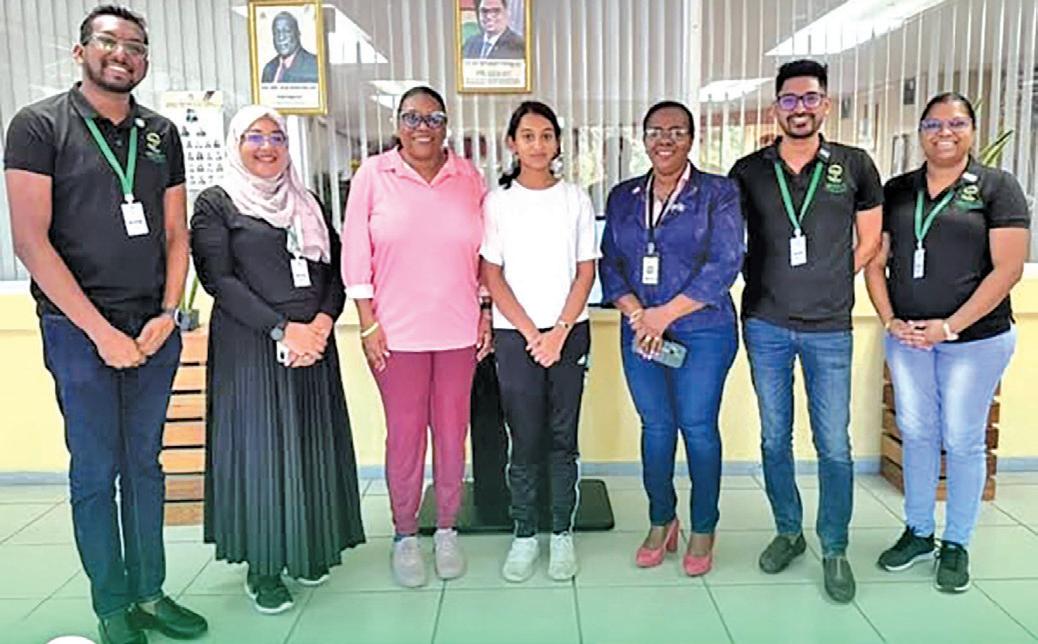
Recover Guyana, QC officials advance plans for Cycle Smart project




Recover Guyana, QC officials advance plans for Cycle Smart project

Police investigate Hampton Court break and enter



63-year-old man killed in logging accident at Mabura Road “Speeding is a choice, drunk driving is a choice” –Minister Walrond ...urges citizens
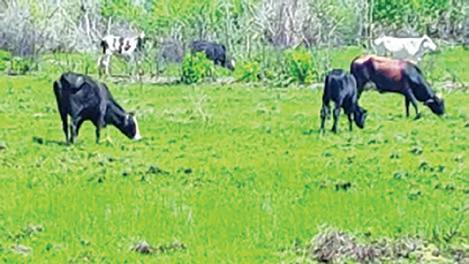
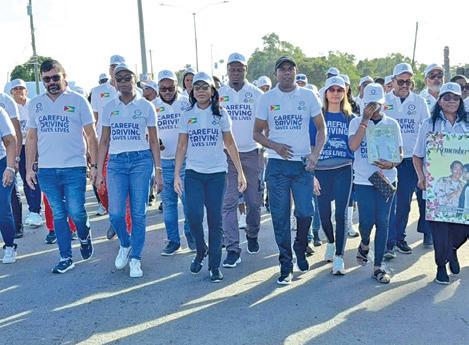
As Christmas nears, Berbice Police move to clamp down on cattle rustling Deep-water port key

3 vendors charged after Arapaima Street altercation
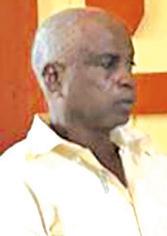






The Berbice Bridge will be closed to vehicular traffic on: Monday, November 17 –14:50h–16:20h and Tuesday, November 18 – 15:20h–16:50h.


Parika and Supenaam departure times – 05:00h, 10:00h-12:00h, 16:00h, 18:30h daily.




Sunny conditions are expected, followed by thundery to light rain showers from the mid-afternoon hours. Partly-cloudy skies and thundery showers are expected at night. Temperatures are expected to range between 23 degrees Celsius and 30 degrees Celsius.
Winds: East North-Easterly to Easterly between 3.58 metres and 4.91 metres.
High Tide: 14:41h reaching a maximum height of 2.51 metres.
Low Tide: 08:16h and 20:39h reaching minimum heights of 0.80 metre and 0.68 metre.










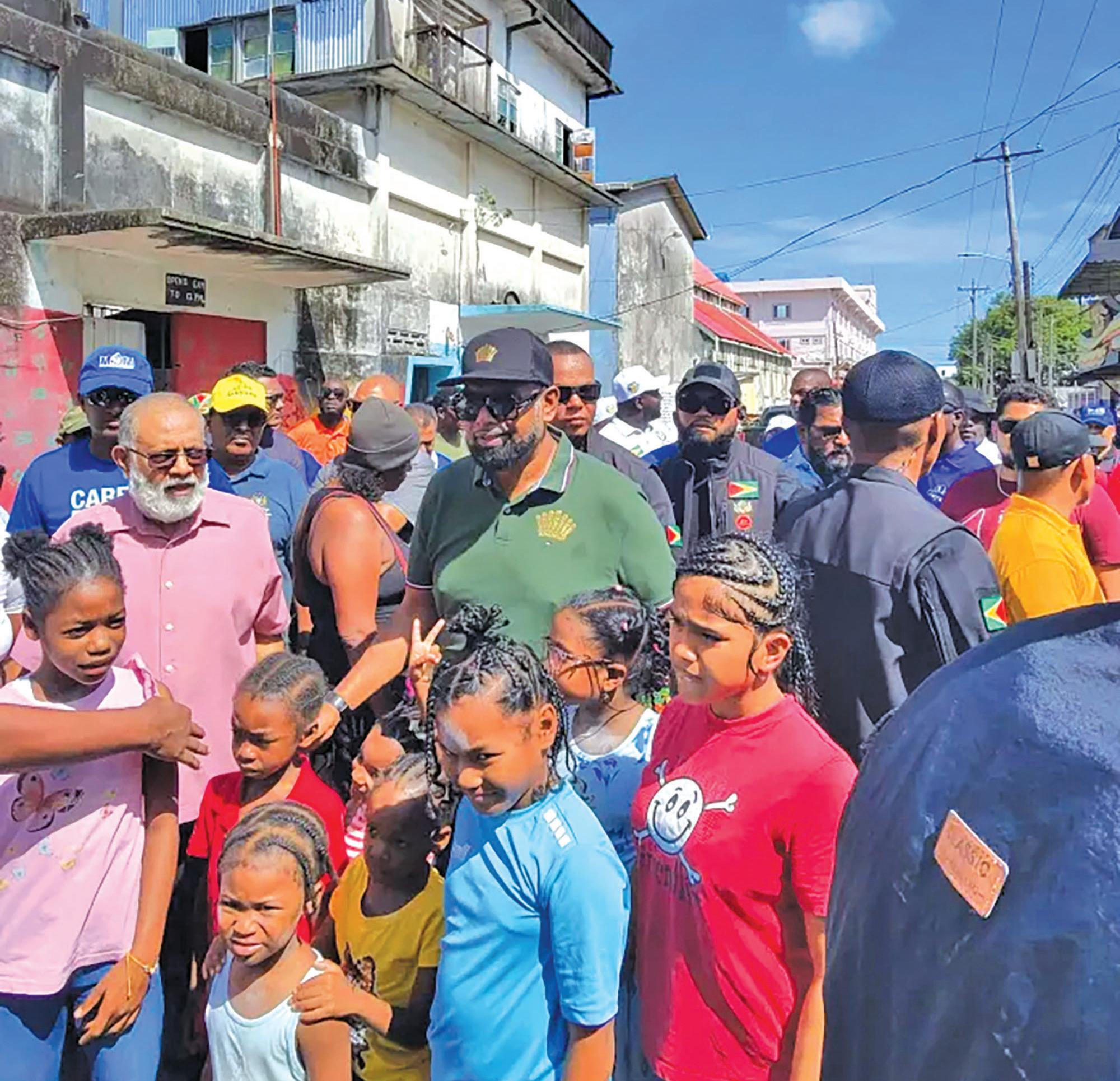
Tiger Bay, long known for its deep-rooted social challenges and vibrant community spirit, is now set to become Georgetown’s first “model neighbourhood”, President Dr. Irfaan Ali announced on Sunday during an extensive community engagement with residents of Kingston, Tiger Bay and Carmichael Street.
The President outlined a transformative urban renewal programme that will include the construction of a futsal and basketball facility, the renovation of two historic buildings, expanded social services for children and mothers, and new mechanisms to help households upgrade their living conditions.
The initiative forms part of the wider One Guyana “Neighbourhood Love” Programme, which aims to rebuild communities through shared responsibility and sustained investment.
The Guyanese leader highlighted the success of the One Guyana Kitchen and Motivation Centre, noting that the facility has already returned more than 60 children to school and provides ongoing mentorship, meals, homework support and sporting programmes. Volunteers from
Men on Mission, community leaders and professionals work daily with the children.
“These are busy people who come out here and spend great time with the children,” the President said, praising the sustained, low-profile work of the Men on Mission team.
“They have done hundreds of houses and supported thousands of families across the country.”
In support of the “model neighbourhood” programme, the Georgetown Mayor & City Council has agreed to hand over two historic properties for rehabilitation. According to the President, the buildings will be restored while preserving their architectural value, and will house a new technical and vocational training centre. School of the Nations has already signalled its commitment to partner with Government to help design and deliver programmes.
The training hub will form part of a broader community development model that includes life-skills training, small-business development and youth engagement.
Support for families
As it relates to housing, President Ali disclosed that government teams
have been engaging families who possess valuable transported land in the area but lack capital to build modern homes. He announced a new initiative to work with banking institutions, engineers and beneficiaries to help them unlock the value of their land through bank-financing and structured housing support.
This initiative will cater for many families who received house lots years ago but have not yet built, and will be supported by Housing Minister Collin Croal and the banking se-
ctor to start construction.
“A family may have land with tremendous value, but multiple households living on it. We are going to help them monetise that asset, create wealth for themselves and improve their living conditions,” President Ali stated.
Highlighting that the Tiger Bay–Kingston district will be central to a new, walking cultural and tourism corridor stretching from the seawall down to Avenue of the Republic, continuing to South Road and looping into the Botanical Gardens, the Head of State disclosed that at least 15 businesses have committed to employ one community member each to serve as wardens responsible for cleanliness, safety and order. Government will also supply trucks and patrol bikes to ensure maintained public spaces.
The transformation includes urban greening, with spaces being opened for the planting of mango, orange, tangerine, cherry, star fruit and other fruit trees. “Our children in Georgetown must enjoy fruit right from the streets,” President Ali said.
He said that with the infrastructure and community support being put in place, stronger city leadership and management are required.
“We are building a stronger city. We also have to build stronger leadership and stronger management in the city. And that test is coming,” he warned.




Editor: Tusika Martin
News Hotline: 231-8063 Editorial: 231-0544, 223-7230, 223-7231, 225-7761
Marketing: 231-8064 Accounts: 225-6707
Mailing address: Queens Atlantic Industrial Estate Industrial Site, Ruimveldt, Georgetown
Email: news@guyanatimesgy.com, marketing@guyanatimesgy.com
The US Government, in the person of Secretary of War Pete Hesgeth, has now formalised the US military buildup and actions in the Caribbean, by giving it a name –Operation Southern Spear. Since late August, around a dozen US warships have taken position in the southern Caribbean, including destroyers, cruisers, landing craft, and a nuclear submarine. The Gerald Ford, the world's largest aircraft carrier has been withdrawn from the eastern Mediterranean crisis region and stationed in the Caribbean as well. It brings some 60 aircraft, including F-18 fighter jets, that dramatically increases the military's firepower in the region and boost the number of troops in Latin America to 15,000. This number of military materiel and personnel is anomalous for the task of stopping a few speedboats.
The US has also reactivated a Cold War-era Naval Station in Puerto Rico – closed since 2004 – in September when F-35B stealth fighters, Marine Corps helicopters and heavy transport aircraft began using the facility's 11,000-foot runway. Meanwhile, one of the US guided-missile destroyers, USS Gravely docked in Port of Spain, Trinidad and Tobago, on October 26 and Marines from the 22nd Marine Expeditionary Unit started conducting training with the Trinidad and Tobago Defence Force. Port of Spain lies less than seven miles from Venezuela's coast.
The US spokespersons – including President Trump – have refused to confirm, for obvious reasons, that this massive build-up of military forces is a precursor to a larger operation than interdicting narco-boats. However, on October 15, Pres Trump said he authorised CIA covert operations inside Venezuela and a week later said he planned to order strikes on land targets. He later amended this to say he is not considering strikes and does not believe the US will go to war with Venezuela. Most analysts, however, are convinced that –even for reasons of national credibility – the US cannot simply withdraw its fleet without removing Venezuela’s Maduro. They have asserted that he leads the drug Cartel de los Soles and is not the legitimate Head of the Venezuelan Government since he flagrantly rigged last year’s General Elections.
The consensus appears to be that the US would not attempt an invasion along the lines of that which they executed to remove the drug-trafficking leader of Panama in 1989. The Venezuelan armed forces is 26 times larger than Panama’s and the 400,000 strong Peoples Militia, led by the ideologically militant Chavista Collectivas, would most likely carry out their mission of waging a guerilla war against the Americans. Most likely, the US might confine its actions to bombing targeted locations and landing Special Forces to extract Maduro for trial in the US.
But regardless of how he is removed, the transition to a new government, democratic or otherwise, will be very traumatic and even lead to a civil war in Venezuela. As such, our leadership should be drawing up and start executing plans for dealing with some of the fallout that will inevitably affect us. Firstly, there is the certitude of another wave – or waves – of mass refugees through all the routes our security agencies should now be familiar with. We have to take control over this situation which can overwhelm us unless we do so. The excuse that we have “porous borders”, after more than a decade of a veritable invasion from Venezuela, has worn thin.
Henry Ziemer, a regional expert at the Center for Strategic and International Studies, identified another threat that must be addressed: “There is a chance that if Maduro thinks he is going down he might make a move to hit something the US cares about, such as oil platforms in the Caribbean Sea. It could be a gamble he may be willing to take that would harm US interests in the region.” Maduro recently requested modern missile systems from ally Russia with which Venezuela has a defence pact. Alexei Zhuravlev, who sits on the defence committee of Russia's Parliament hinted that his country might even supply Oreshniks – Russia’s medium-range hypersonic ballistic missile.
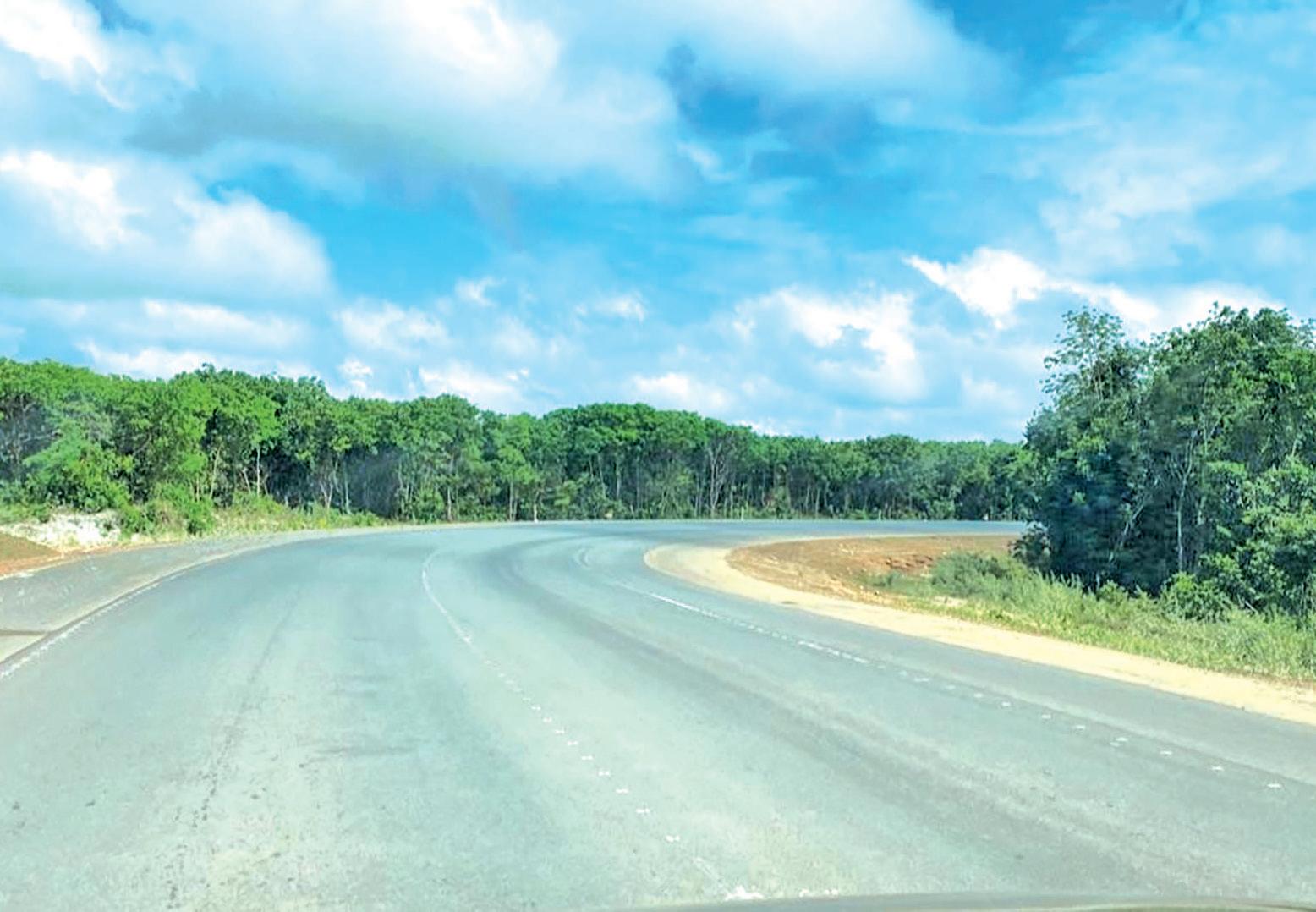
The project is divided into phases or lots, with the first phase currently underway from
We must save Britain’s oldest curry house. It represents everything that’s good about our country
–
Veeraswamy symbolises the successful integration of Indian people and closing the restaurant would be nothing short of cultural vandalism
By William SitWell
It’s not just another ancient curry house. Its disappearance won’t just be another lost teardrop in the annihilation of hospitality. Veeraswamy is more important than that. It is Britain’s oldest Indian restaurant and it doesn’t just represent somewhere where, after a perky starter of some tandoori green prawns, you can luxuriate in a classic chicken makhana with lashings of wet and creamy masoor dal tadka.
It symbolises one of the great achievements of Britain’s immigrant story, the quite delicious food that has ensued, and how that has become an indelible part of our national character.
Yet right now it is under threat, and really ought not to be. For the Crown Estate, the landlord of the building which Veeraswamy occupies (Victory House on London’s Regent Street), reckons that the establishment stands in the way of progress – or, rather, their notion of progress. Which is, now that Veeraswamy’s lease has expired, to turf out the Indians and turn the restaurant into a nice, big reception area for the offices upstairs, which doubtless would help them to arm-twist those tenants into paying a bit more rent.
The Crown Estate can argue that this is their job, as they seek to maximise revenue that is, technically, “in the right of the Crown”. The estate pays profits to the Treasury (which needs all the help it can get right now) and to the Royal family, in the form of the Sovereign Grant.
Yet surely the King, given his love of tradition, his family links to the Empire and his appreciation for the peace that flows from sharing great food, would sooner cut someone’s head off than let Veeraswamy bite the dust?
He wouldn’t be alone in this sentiment. This week, a handful of the nation’s leading chefs wrote to a newspaper to express their dismay at the restaurant’s potential closure, urging the Crown Estate to “engage in a meaningful dialogue to secure Veeraswamy’s future at its rightful home in Victory House”, and adding that it is “an icon of national culinary history”.
The likes of signatories Michel Roux Jr and Raymond Blanc are, of course, right, because the landlord isn’t considering slinging out Veeraswamy because it can’t pay the bills. Indeed, its longevity points to the endearing love affair Britons have with Indian food and how dishes,
such as chicken tikka masala, are now as British as a Sunday roast.
It’s also a happy story of immigration – which, as we seem to rediscover on a daily basis, is a rarity. Today, the success of the immigrant melting pot can be measured in the array of cuisines available on every high street. London has a greater offering of foreign restaurants than any other city on the planet, and our relationship with Indian food is a particularly special one.
It can be traced at least to the formation of the East India Company in the 1600s – there is a curry recipe in Hannah Glasse’s recipe book of 1747. Though, during the Raj, the British demanded milder curries than the locals enjoyed, today every town in Britain has an Indian restaurant.
And the story over the last 30 years has been about improvement, of how the standard Bangladeshi offering has morphed into more specialised ones, with restaurants competing on regional grounds. Thus, my current favourite of at least a dozen in nearby Taunton is Mattancherry, for its acute, authentic and glorious celebration of the food of Kerala.
So, today, we seek Indian food for comfort, for the thrill of spice and
for the happy space shared with our Indian friends in curry houses throughout the country. We relish their presence, a successful integration into Britain that is one positive product of Empire. We cherish our brotherhood as an unbridled success story of multiculturalism.
If anyone looks to our country and suggests we are a bunch of Brexity introverts who disparage foreigners, just tell them about our food offering, our restaurants, the globe-trotting ready meals we snap up in the supermarket aisles, the pots and mixes we have in our spice racks at home.
Veeraswamy, whose building name, Victory House, could not be more appropriate, must be saved for more than its great food, service, and rich décor. It is a beacon of the joyful communing of linked nations in mutual appreciation, and something that should not be torn down for financial reasons, or indeed simply to give some folk a slightly nicer entrance to their office.
(The Telegraph) (William Sitwell is The Telegraph’s Restaurant Critic as well as a writer and broadcaster for radio and television. He has written four books including The Restaurant: A History Of Eating Out.)
Dear Editor, Justice Gino Persaud’s recent ruling in favour of the Mohameds is being portrayed by some as a triumph of judicial independence and even as a political blow to the PPP. The anti-PPP commentators are already gloating. But in Washington, this ruling has triggered something far more serious: it has placed Guyana’s judiciary directly under the scrutiny of the United States Government.
To U.S. officials, this ruling is not a victory for the rule of law — it is a warning that
Guyana’s institutions may be buckling under pressure from one family’s influence. Publicly, the U.S. Embassy will offer the predictable diplomatic nicety: “We continue to respect Guyana’s judicial process.” But privately, the reaction will be very different. Officials at the State Department, Treasury, and Department of Justice will interpret this outcome as confirmation that the Mohamed network — already sanctioned and indicted by U.S. authorities — still holds sway. They
will see a regulatory system vulnerable to manipulation, and a justice system not yet equipped to confront the scale of transnational financial crime outlined in the OFAC sanctions and federal indictment.
But anyone celebrating this ruling as a first step toward defeating extradition is deeply mistaken. In strategic terms, the ruling strengthens — not weakens — the U.S. drive to remove the Mohameds from Guyana’s jurisdiction. Washington already believed that the Mohameds
could not be effectively prosecuted or regulated at home. This ruling now cements that belief. Rather than delaying the proceedings, it will accelerate them: it gives the DOJ more ammunition, more justification, and more urgency to press for rapid judicial progress. In the eyes of Washington, Guyana has just signalled that it cannot reliably deliver accountability when politically connected defendants are involved.
While the ruling may lead to sharper diplomat-
ic exchanges and more aggressive U.S. monitoring of Guyana’s financial enforcement landscape, it has also produced an unintended geopolitical consequence — one that will not favour the Mohameds. It has brought the PPP government and the United States into perfect alignment. Both Washington and the Ali administration share the same objective: the removal of the Mohameds from Guyana’s jurisdiction through extradition. Both see this not as a political matter, but as a test of whether Guyana can
uphold the rule of law in an era of unprecedented economic transformation. So although Justice Persaud’s ruling may have offered the Mohameds a short-term public-relations victory, it guarantees a far more consequential longterm defeat. It sets the stage for intensified cooperation between Washington and Georgetown, and it paves the way for the extradition proceedings to accelerate — not slow down.
Sincerely,
Suresh Dookhie
Dear Editor,
As a former Study Coordinator at the Bertram Collins College of the Public Service (BCCPS), I believe it is important to offer a factual and experience based perspective on the ongoing discussion surrounding public service training in Guyana. While the College served a purpose during its brief existence, it was fundamentally structured for a bygone era and did not align with the educational and administrative needs of a modern public service.
One of the most significant limitations of the BCCPS was its lack of accreditation by the Accreditation Council of Guyana. This meant that the qualifications received by cadets did not meet nationally recognized standards. The absence of accreditation further restricted graduates from pursuing academic progression or gaining broader recognition for their studies, ultimately limiting the programme’s long term value.
The institutional design of the College also raised serious concerns. The leadership structure was dominat-
ed by former army generals, colonels, sergeants, and other military personnel, rather than individuals with professional training and expertise in public administration or public service reform. This resulted in a culture and policy environment that closely mirrored the organisational framework of the Guyana Defence Force. A military oriented model is not inherently inappropriate, but it is ill suited for an institution that was intended to prepare a civilian workforce for roles that require administrative competence, policy literacy, and service delivery skills.
Although the concept behind the BCCPS may have been noble, the execution was deeply flawed. The programme catered to a select and often politically favoured group of individuals, limiting access to many talented and deserving Guyanese. The curriculum was one dimensional and offered no meaningful opportunities for specialization. Every cadet followed the same general pathway, despite the diverse needs of a modern public service that requires technical expertise

in numerous fields.
My continued interactions with former cadets reveal another important concern. Many did not remain in the public service after graduation. A considerable number left to join the private sector, start their own businesses, or exit public employment entirely. This indicates that the programme did not achieve its intended objective of building a stable, long term public service workforce. Instead, it created internal tensions within agencies. Cadets were placed at the Clerk Three level, which of-
ten positioned them above Clerk One and Clerk Two officers who had more qualifications and greater experience, and who were then required to train individuals who entered above them. This understandably undermined morale and organisational harmony.
By contrast, the government’s partnership with Coursera represents a modern, inclusive, and forward looking approach to national human resource development. Coursera offers access to globally accredited and internationally recognized programmes designed

by some of the world’s leading universities and institutions. The platform is open to every eligible Guyanese, regardless of background or political affiliation. It supports specialization, facilitates upskilling in hundreds of areas, and aligns with the realities of a technologically driven twenty first century workforce.
This initiative is not limited to the public service. It extends opportunities to the private sector and to all citizens who wish to expand their knowledge and enhance their professional abilities. It represents a
shift from exclusivity to equity, from outdated training models to globally competitive standards.
Guyana is positioning itself for rapid transformation in the years ahead. To sustain this momentum, our education and training systems must evolve. The BCCPS was firmly rooted in the past. Coursera provides a pathway to the future and ensures that learning is accessible, relevant, and responsive to the needs of a modern society.
Sincerely, Samuel Sandy



The area of composite shapes is the amount of space inside a shape composed of basic shapes put together. It is measured in square units (cm2,m2,mm2 etc.).
Composite shapes can also be called compound shapes or composite figures.
To find the area of composite shapes, you must decompose the composite shape into basic shapes, then find the area of each of the basic shapes and add them together.
For example,

Your final answer must be in square units. For example, square centimeters (cm2), square meters (m2), square feet (ft2), etc.

Find the area of the composite shapes below:


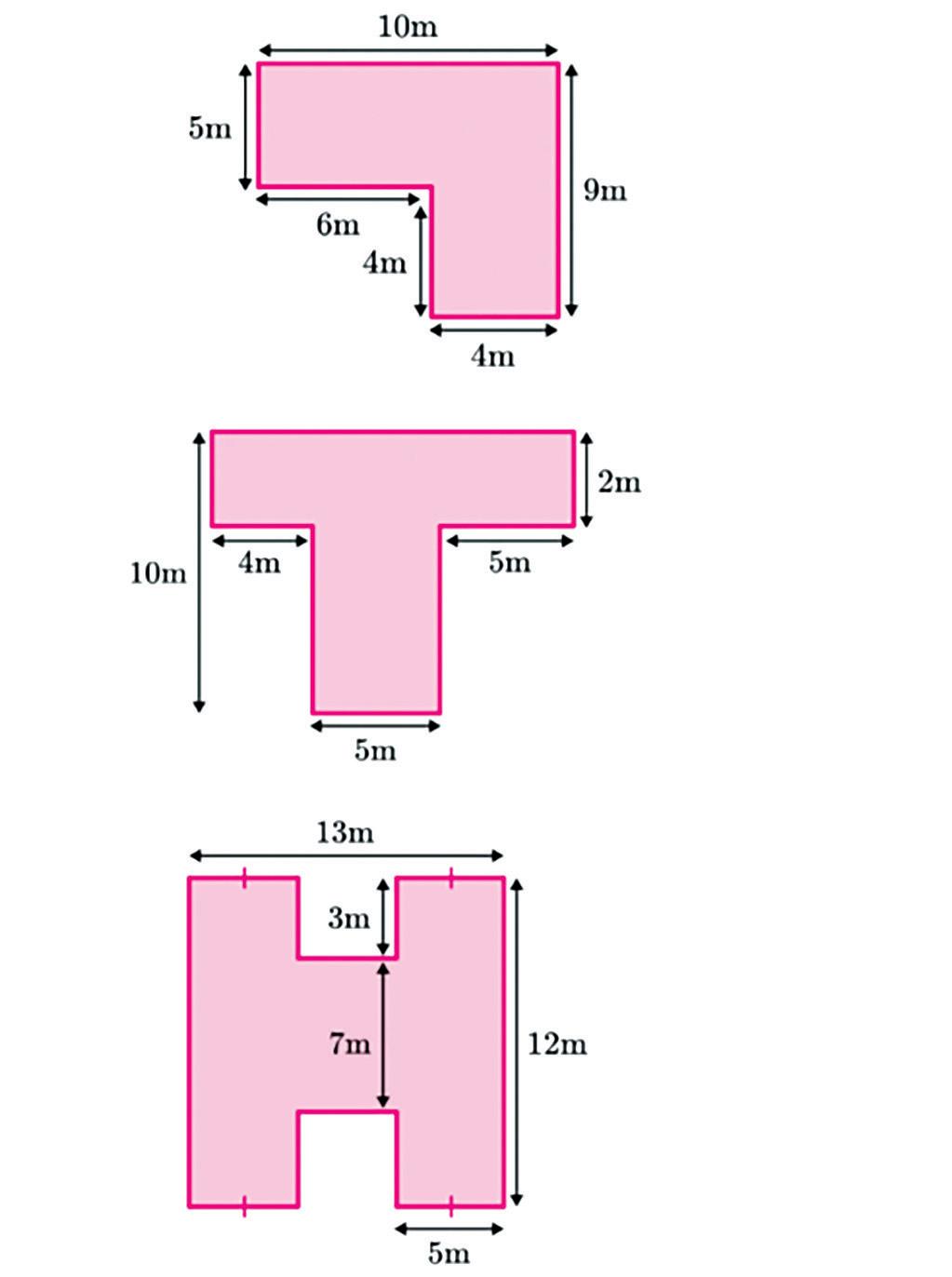
final project. Once you have your final design, use the glue stick to secure the pieces of paper to your paper or posterboard.
Step 5: While working, talk about how both the person giving care and the person receiving care bring their whole hearts to each other.

Caregiving and receiving is a partnership. Ask each other the following questions or think of questions that are specific to your family.
When has someone cared for you?
What was it like? How did they help you feel better?
When have you cared for someone?
What was it like? How did you help them feel better?
What kinds of feelings do you want to put in someone’s heart when you help care for them?
Just like building a mosaic together piece by piece, families can build a space for open communication around caring for one another. (pbs.org)


By RoBeRt Louis stevenson

When I was sick and lay a-bed, I had two pillows at my head, And all my toys beside me lay To keep me happy all the day.
And sometimes for an hour or so I watched my leaden soldiers go, With different uniforms and drills, Among the bed-clothes, through the hills;
And sometimes sent my ships in fleets All up and down among the sheets; Or brought my trees and houses out, And planted cities all about.
I was the giant great and still That sits upon the pillow-hill, And sees before him, dale and plain, The pleasant land of counterpane.

Write a story that includes the phrase “It was a dark and stormy night.”





To curb traffic accidents and fatalities, Minister of Home Affairs, Oneidge Walrond, announced plans to engage the Ministry of Legal Affairs and the Attorney General’s (AG) Chambers to introduce stricter penalties for reckless driving. The announcement came during the Road Safety Awareness Walk 2025, held under the theme “Careful Driving Saves Lives” at the Kingston Seawall Bandstand.
Addressing a gathering of officials, community leaders and families affected by traffic accidents on Sunday, Minister Walrond emphasised that policy alone cannot change behaviour, but it can set the framework for accountability. “We are pushing for stronger penalties…we have already engaged the Ministry of Legal Affairs, Attorney General Chambers and we have a draft in hand as well,” she said, underlining the government’s proactive approach. The Minister explained that these measures are part of a broader strategy to strengthen en -

Home Affairs Minister Oneidge Walrond
forcement and promote a culture of responsibility on the roads. She highlighted ongoing collaboration with the traffic authorities, noting, “Under the leadership of the commissioner, he has taken the bold step to make sure that every -
one is accountable, and he has the full support of our Government.”
Minister Walrond also stressed the importance of education and awareness in reducing road accidents.
“We are expanding both safety and education…I see every day, the assistant commissioner sending me pictures of what they are doing in the regions to educate our children,” she said.
While acknowledging progress in traffic management over the years, the Minister stressed that every death on the roads is preventable and unacceptable.
“One death is too many… we honour the victims, continue to support the family and reaffirm that these accidents are tragedies that we have the power to prevent,” she stated. The new legislative initiative aims to make penalties for reck -
less driving more efficient to enforce, including suspension of licences and stiffer fines for offenders, addressing challenges with current enforcement procedures. “Especially for those who recklessly seek not to adhere to the law…there’s something called reckless negligence…if you cause a life to be lost, it is reckless, and it ought to be considered for stiffer penalties,” the Minister added. The Road Safety Awareness Walk brought together members of the public, officials and representatives from the Guyana Police Force (GPF), Guyana Prison Service (GPS), Customs and other agencies, underlining the collective effort required to build a road culture grounded in accountability, respect, and the value of human life. Minister Walrond con -
cluded by calling for transformation, not just remembrance, urging citizens to make safer choices on the road. “Let us honour those we lost, not only with remembrance, but with transformation,” she said. As of September 2025, more than 81 people have died in road accidents across Guyana so far this year, Police said. Police data show a total of 1,049 accidents of all categories – fatal, minor, and damage, compared with 1,076 during the same period in 2024. While speeding remains the leading cause of crashes, it was reported that inattentiveness has surged by nearly 600 per cent compared with last year. The GPF urged drivers to practice defensive driving and show greater courtesy to vulnerable road users.
Deep-water port key to unlocking Guyana’s shipping, manufacturing and food potential
Chairman of the Private Sector Commission (PSC), Captain Gerald Gouveia Jr, says the construction of a deep-water port remains one of the most critical national projects needed to fully unlock Guyana’s future in logistics, manufacturing, agriculture, and regional trade.
Speaking during a recent episode of the Starting Point podcast, Gouveia said the local business community is actively responding to President Irfaan Ali’s call to innovate, collaborate, and build new economic “empires” as Guyana undergoes unprecedented transformation.
Gouveia noted that Guyana’s rapid transition from oil exploration to production—completed in just five years compared to the decades it takes most countries—has forced the private sector to expand its capabilities and embrace strategic international partnerships.
This has allowed businesses to scale operations in areas such as technology, logistics, data services, specialised equipment handling, hazardous materials transport, warehousing, and accommodation. He added that the PSC is now finalising recommendations for expanding the Local Content Act, which will soon be formally submitted to government.
Competition to collaboration
Responding to the President’s repeated call for cultural change within the business community, Gouveia said Guyanese companies are increasingly shifting from a “crab in a barrel” mentality toward collaboration. He explained that prior to 2020, Guyana’s smaller economy forced businesses to compete for limited opportunities. Today, however, the “pie is bigger,” and companies have realised that collectively they can secure larger contracts, especially

in the high-demand oil and gas sector.
He cited the national soya and corn project— driven by a consortium of agricultural players— as a powerful example of Guyanese companies joining forces to build new industries. The PSC, he said, has established a formal consortium framework and has already created eight mini-consortiums across
tourism, housing, shipping, and construction. These groupings allow medium-sized businesses to match the scale, expertise, and capital of incoming international companies.
Turning to the shipping industry, Gouveia said the private sector’s number-one request is pace in the development of the deep-water port, which he described as a “force mul -
tiplier” for Guyana’s economy. The port, when combined with the highway link to northern Brazil, would give Brazil direct access to the Atlantic through Guyana; position Guyana as the logistics hub of the Caribbean and northern South America; eliminate the need for transshipment through Trinidad or Jamaica; reduce shipping time and cost; support large-scale manufacturing once gasto-shore power reduces electricity costs; and provide reliable export routes for Guyana’s expanding agriculture and agro-processing sectors.
He said that everyone is paying attention to the harbour, especially how it links to the Brazil road, because once both come online, the possibilities become limitless.
“You've heard also that the president is talking about boosting the agriculture sector. When we start to really get into the
agro-processing and the agriculture sector, we need an outlet that we can't have sitting on the wharf in Trinidad for weeks going to UK or going to the US or so on. So this now gives us the ability to really take advantage of Guyana's true potential,” the Chairman said.
As PSC Chairman, Gouveia said his focus is to cultivate unity, expand Guyanese participation in major industries, and ensure the business community is equipped to partner with international investors on equal footing. He said the commission will continue pushing collaboration, building consortiums, supporting innovation, and advocating for policies that expand opportunities for Guyanese companies.
“This is Guyana’s moment,” Gouveia said. “Together, we can build industries and empires that will last for generations.”


A63-year-old logger died in a tragic accident at a logging concession along Mabura Road, Region 10 (Upper Demerara – Berbice) after he was struck by a tree.
Chris Hall, known as “Chatch,” was a logger and skidder operator from Grant Sand Road, Soesdyke, East Bank Demerara (EBD). Hall was struck by a falling tree branch while working at the concession at
43 Miles, Mabura Road, on Saturday, November 15. Hall was rushed to the Linden Hospital Complex, where he was pronounced dead by medical staff. His body has been transferred to the Pensioners’
Mortuary, pending a post-mortem examination. Police in Regional Division #10 have confirmed that investigations into the circumstances surrounding the incident are ongoing.



Your Eyewitness was quite chuffed when he perused his Sunday rag and noticed that three young business entrepreneurs are launching a Drone Delivery Service!! Imagine that!! Your Eyewitness thought it was revolutionary when he could DRIVE to the shop or market – rather than walking – to forage supplies to feed his family!! Before that he remembers old man Sugrim bringing “rations” from the salt-goods store to his grandmothers’ home!! He never got around to using the delivery services the fast food joints use nowadays to bring over his food – ‘cause he’s in deep country and deliveries to his home cost more than the food!! Not a viable option for him!!
And here it is, he’s gonna just place his order and a drone will fly in whatever he purchases?? The mountain coming to Mohamed so to speak!! He’d read of one company doing this drone delivery in Ireland –the owner called it “Manna”. Like “Manna from heaven”, get it?? Being Ireland and all that, your Eyewitness wondered at the time whether the Irish craving to have their nip created that market!! It’s not for nothing that their name for whiskey is “uisce Beatha” – literally meaning “water of life”!!
Anyhow back to our about-to-be-launched drone delivery service – which has been named “Drone Dash”!! Your Eyewitness suspects that because of that gas station bombing in mid-town GT recently, the first thought that came to his (paranoid?) mind was “Ain’t this gonna make it easy for terrorists to deliver their (explosive) packages??” So, he rather suspects that a strict regulatory regime’s gonna have to be introduced and refined not just to deal with logistical challenges like drones hitting cranes and such like – as happened in Frisco to an Amazon delivery drone – but substantive ones to ensure the stuff being delivered is what was ordered!!
In the States, the FAA had to create a web of drone regulations to keep the technology in check – including a drone remote ID law!! Are we ready?? Amazon’s Bezos has boasted back in 2013 about 30-minute drone deliveries becoming as common as delivery trucks – but that still hasn’t happened innit?!! The first company in the US took wing in 2016 and growth has been extremely slow. There gotta be a reason, no? And we should find out what that is!!
Now there’s no question there’s gonna be a market for this new delivery service. Right off the top of his head your Eyewitness can think of out-of-stock medicines to all these new hospitals being constructed – and also to our medexes and health centres in our remote interior!!
But while we shouldn’t throw out the baby with the bathwater, we shouldn’t rush in where (US) regulatory angels fear to tread!!
…politics in Guyana
Your Eyewitness is getting quite antsy about when this new rising of the dawn of non-racial politics gonna kick in!! He was assured that the performance – not just promise – by the Indian Sanction Man pulling most of his 110,000 votes from the African Guyanese camp owned by the PNC for some sixty-odd years was the harbinger of this new age!! And he was as happy as a pig in a slop of garbage!! At long last, folks were gonna be discussing the pressing issues of the day affecting them and from which the politicians would deliver them!!
But instead, all he’s been hearing about from the harbingers are the intricacies and nuances of a 1931 extradition treaty with the US!!! What the heck does this have to do with the price of bread at Yong’s Bakery?? And for those of us who can’t make roti, it’s bread that keeps us going, innit??
Why can’t Sanction Man show that the new politics means being willing to face the music??!!
…new relief supply
Your Eyewitness’ eyes lit up on reading that DDL sent a container of relief to hurricane-hit Jamaica. He has some great Jamaica friends and knew they missed their rum. Only to find out DDL sent just water and juice!!







Speaking at the Road Safety Awareness Walk 2025, held Sunday morning at the Seawall Bandstand under the theme “Careful Driving Saves Lives,” Traffic Chief Assistant Commissioner Mahendra Singh delivered a frank and emotional critique of shortcomings within Guyana’s justice system as it relates to road fatalities and serious accidents, saying “gaps in accountability have real consequences”.
In what many attendees described as one of the
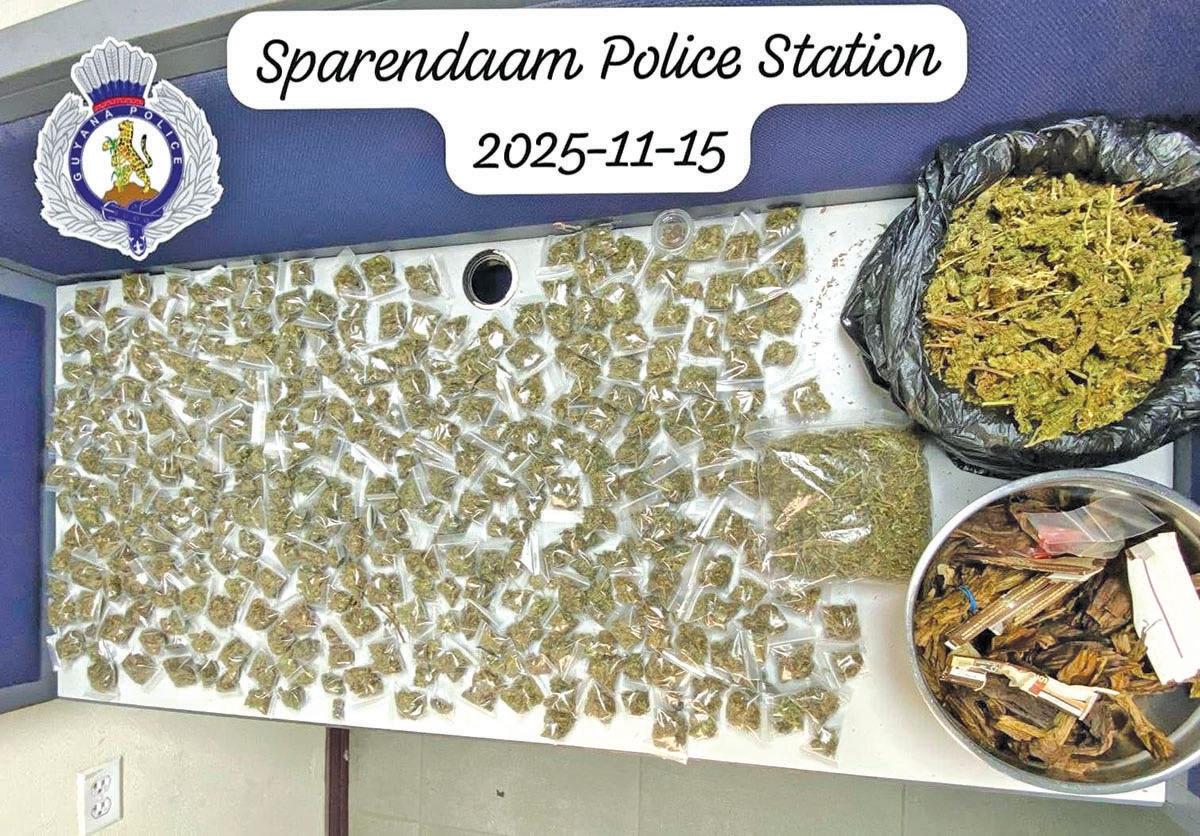
Ranks of the Guyana Police Force, Regional Division 4 ‘C’ (East Coast Demerara) recovered several quantities of sus-
pected cannabis and arrested four men during a coordinated operation carried out on Saturday, within the Sparendaam Police Station
most striking parts of the programme, Singh openly acknowledged that the system often falls short in delivering justice for victims of road crashes. “Sometimes the system doesn’t work,” he told the gathering, explaining that as a senior officer, he has experienced the consequences firsthand. Recounting a major accident he was involved in while serving as Regional Commander of the East Bank Division, Singh said the matter was dismissed in court because both he
and the driver of the other vehicle were unconscious after the collision. “The matter was dismissed in a court of law because myself and the driver, both were unconscious at the time and they could not find out who was driving the motor vehicle that crashed into a police-designated vehicle I was utilising,” he said. He also alluded to public frustration with lenient sentencing and unresolved fatality cases, noting that although charges are sometimes laid, the outcome does not always satisfy
victims’ families. “Though the system worked that charges were laid and convictions were had, maybe the extent of consolidated sentences… did not draw the amount of satisfaction we look for.” The Traffic Chief said these gaps in accountability have real consequences, reinforcing the painful testimonies heard earlier in the programme from grieving family members. He stressed that the police continue to “do the needful,” but acknowledged that systemic constraints sometimes stand
in the way of justice. Despite these challenges, Singh promised that the Police Force is advancing, pointing to improvements in investigative capacity. “Capacity development is taking place, we have more trained investigators and we are supported by technology which we have adopted.” He urged the public to continue partnering with law enforcement, saying true change must come from shared responsibility. “Work with me. It’s “us”, and not me against you. We are in this equation.”

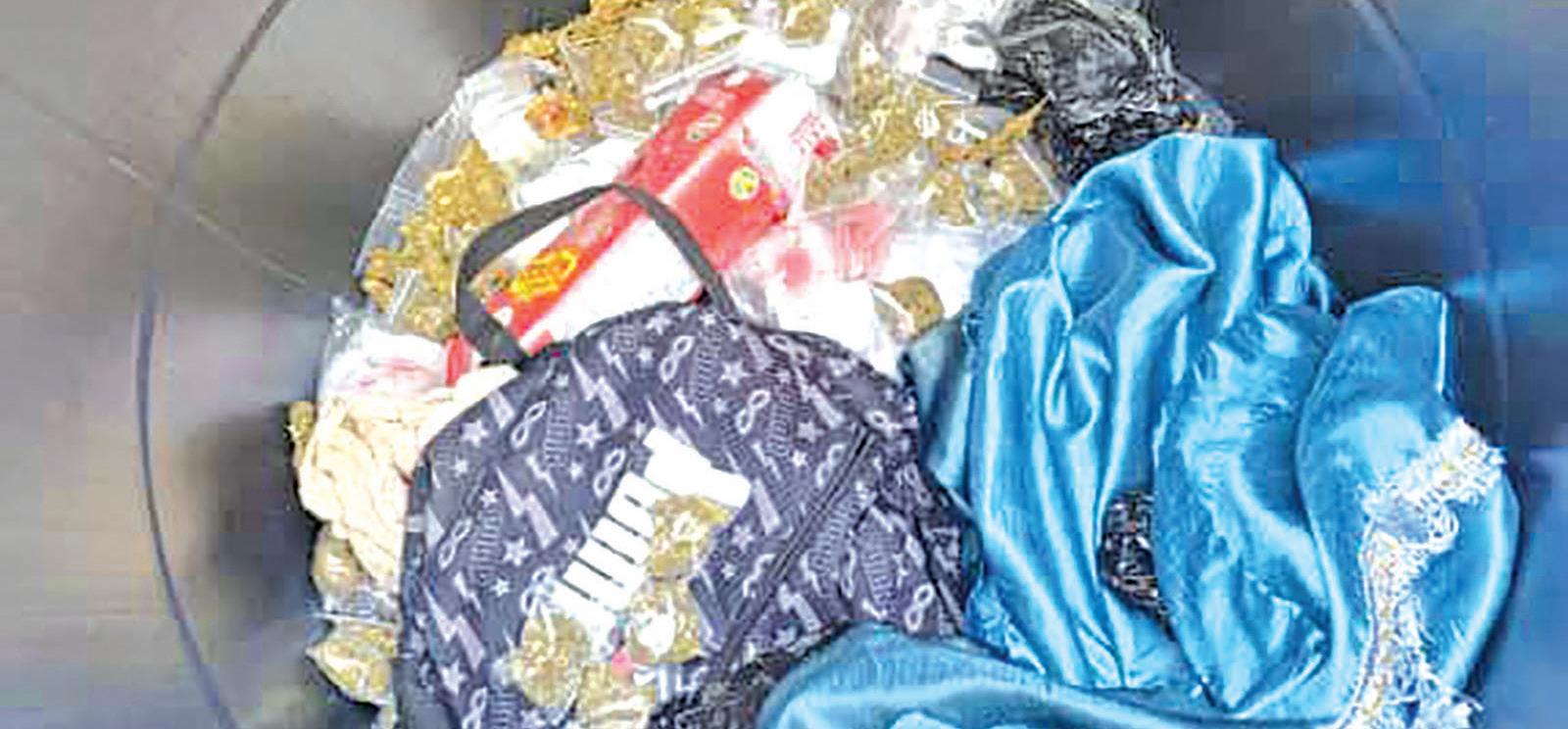
District.
The first set of discoveries occurred at a property in Better Hope South, where police intercepted two men.
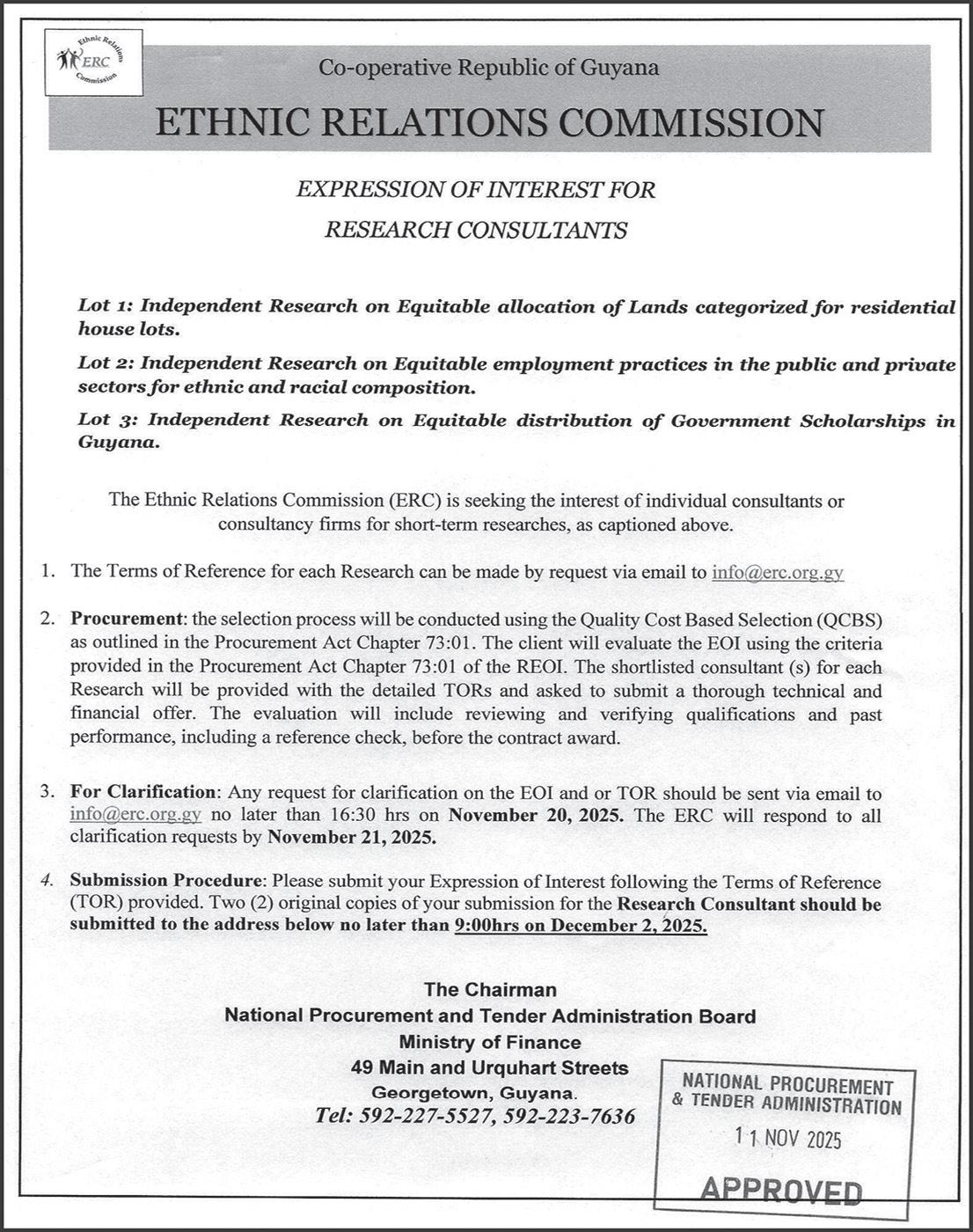
According to the division’s report, ranks found 247 grams of leaves, seeds, and stems suspected to be cannabis on the person of a 26-year-
old gold miner of Britton Street, Plaisance. A further 63.5 grams of suspected cannabis were reportedly found inside a wardrobe belonging to a 48-year-old construction worker of Better Hope South.
Both men were arrested and taken to the Sparendaam Police Station. The suspected narcotics were weighed in their presence, then lodged as evidence.
Police then moved their operation to Britton Street, Plaisance, where additional suspected cannabis was recovered in two separate yards.
Ranks discovered a quantity of the illegal substance hidden inside a black plastic barrel in one yard, and another stash concealed in a black
plastic bag among vegetation in a separate yard. The narcotics weighed 1,411 grams in total.
The material was taken to the Sparendaam Police Station, where it was marked, sealed, and lodged. No arrests were made in connection with this find. Investigations are ongoing
During the same operation, two additional arrests were made for separate matters. Police detained a 32-year-old taxi driver of North Sparendaam in relation to an alleged larceny of cattle, and a 33-year-old construction worker of Vryheid’s Lust for allegedly discharging a loaded firearm.
Investigations into all the matters continue.
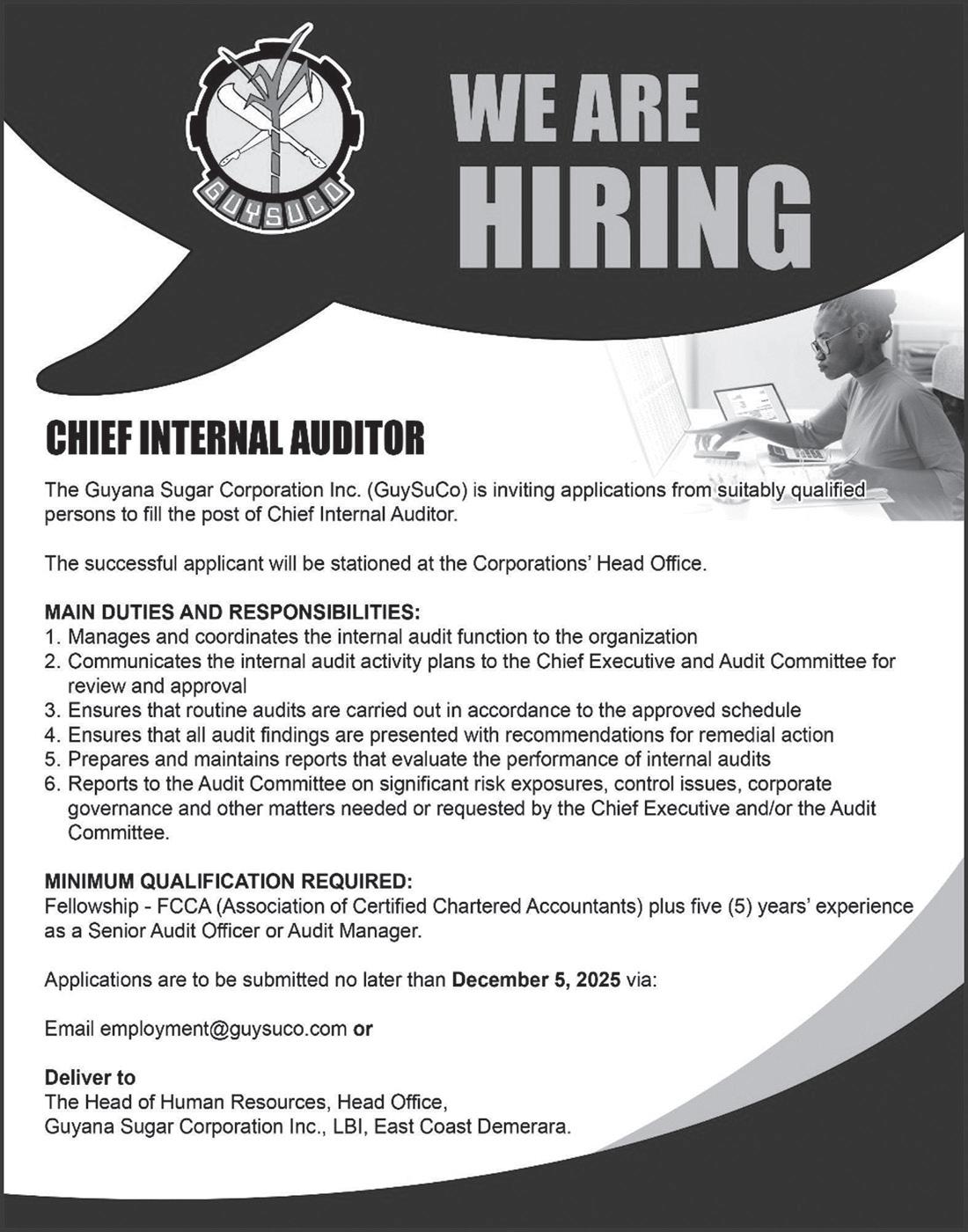

Health Minister, Dr Frank Anthony has dismissed renewed calls from Opposition Member of Parliament (MP) Coretta McDonald to reopen the Bertram Collins College of the Public Service, describing her criticism of the Government’s partnership with Coursera as politically driven and out of touch with modern educational needs. Dr Anthony, responding to McDonald’s statements, said the Opposition’s defence of the former training institute reflects “a nostalgic but misleading attempt” to revive an institution that was never designed to meet the demands of a contemporary public service. The College, located at Ogle on the East Coast of Demerara (ECD), was opened in 2016 under the former coalition Administration to train
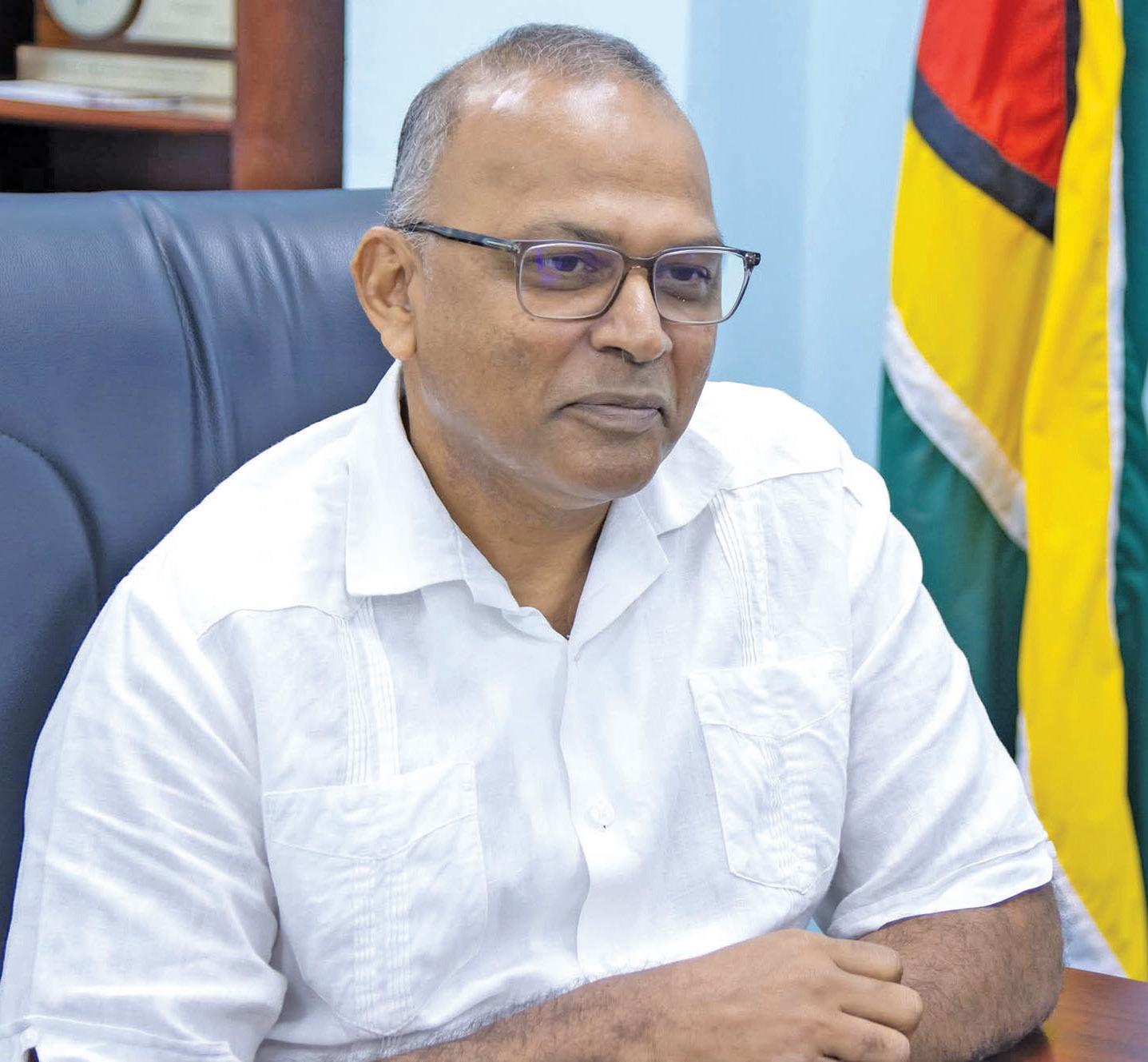
Health Minister, Dr Frank Anthony
persons desirous of entering the public service.
According to the Minister, the Bertram Collins College, established under the former A Partnership
for National Unity/Alliance for Change (APNU/AFC) Administration, functioned less as an academic institution and more as a politically aligned pro-
The Human Services Ministry is celebrating another remarkable centenarian whose life continues to inspire all around her. Sarah Iris Young, who turned 100 yesterday, Sunday, remains a beacon of joy, resilience, and unwavering spirit—a woman who still sings, still dances, and still lights up every room she enters.
According to the Ministry in a recent press release, since her childhood days in Essequibo, Sarah Young carried her bright, youthful energy throughout her life, becoming the matriarch of a large and loving family.
She is the proud mother of five children and grandmother to four, all of whom speak fondly of the warmth and grace she brought into their lives. Her home in Cummings Lodge has always been a gathering place—full of laughter, memories, and the gentle energy that seemed to follow her wherever she went.
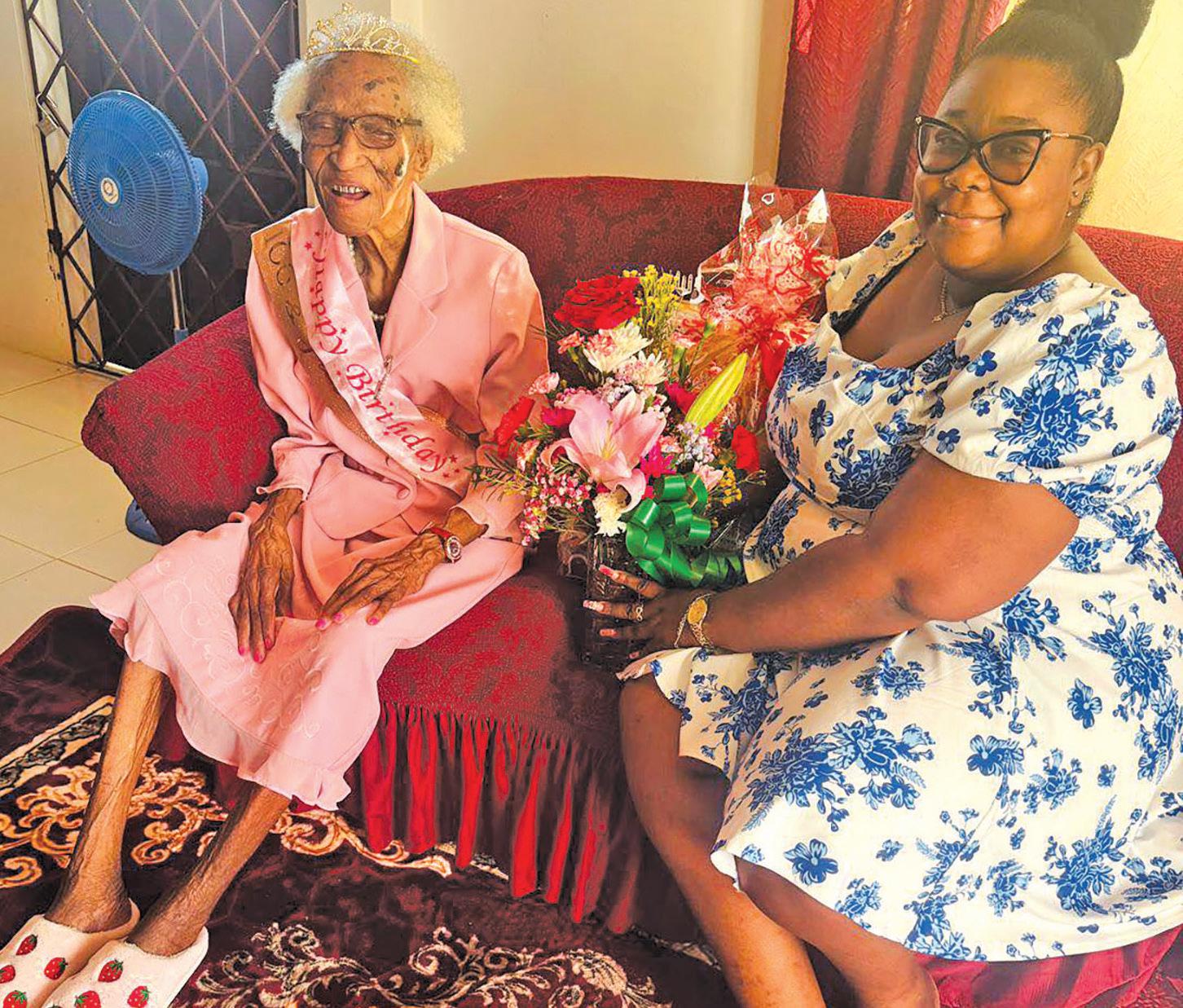
It was also highlighted that Young was married for many decades and often described love as her greatest blessing. But close behind was her lifelong relationship with music. Every Sunday, dressed in her best, she made her way to church, ready to lift her voice in song. Her hymns, sung with strength and clarity, carried a joy that warmed the entire sanctuary. But among those who knew her best, it was her dancing that made her unforgettable. She could outdance people half her age, moving with a rhythm that felt woven into her very being. Whether celebrating at family events or simply enjoying an afternoon with loved ones, she moved with effortless grace and conta-
gious energy. She loved visiting relatives, sharing stories, offering guidance and leaving behind her trademark laughter that lingered long after she left. Even at 100, Mrs Young remained a woman of light—present, joyful, and full of life. As her family and community gathered to honour her milestone, they celebrated not just her years, but her spirit: a reminder that life, at any age, is meant to be embraced fully, joyfully, and with a heart ready to sing and dance.
gramme intended to shape party loyalty. “It was not a bastion of excellence,” Dr Anthony said. “It was a political institution… more a factory for ideological conditioning than a centre of professional training.”
In contrast, he emphasised, the Government’s partnership with Coursera provides world-class, non-partisan educational opportunities. The online learning platform works with leading global universities including Yale, Stanford, Johns Hopkins and Imperial College London, offering thousands of accredited courses across multiple disciplines.
“Coursera is not interested in which party you vote for,” Dr Anthony said. “Its only focus is empowering learners with knowledge, skills and opportunities — and that is exactly the kind of transformative ac-
cess our country needs.”
The Minister argued that McDonald’s critique ignores the realities of a modern public service and the scale of training required in a rapidly developing country. He noted that while the Bertram Collins College trained relatively small cohorts, the Coursera initiative is designed to offer upskilling to as many as 27,000 public servants in a single year. Dr Anthony outlined several advantages of the Coursera programme, including nationwide accessibility, globally recognised content, and the ability to upscale training at unprecedented levels. He said this aligns with Guyana’s broader goals for digital readiness, professional development and national competitiveness. Responding to the Opposition’s claim that the
online platform “produces users, not public servants,” the Minister argued that such a view is both inaccurate and outdated.
“Coursera produces empowered, critical thinkers — people ready to serve with modern skills and global awareness,” he said. “Guyana does not need institutions built to reinforce party loyalty. It needs innovation and systems that prepare citizens for life and work in the 21st century.” Dr Anthony maintained that the Government’s focus is on future-oriented education initiatives that expand opportunity, rather than reviving institutions “rooted firmly in the past.”
“Education must evolve, or it will fail,” he said.
“Bertram Collins belonged to another era. Coursera is a tool for the future — and Guyana must build for that future together.”



“Speeding is a choice,
is a choice” – Minister Walrond ...urges citizens to take responsibility on the roads

Home Affairs Minister
Oneidge Walrond has stressed that every individual carries a measure of responsibility in preventing road accidents, urging citizens to make the right choices and take accountability for their actions on the roads.
She made these remarks during the Road Safety Awareness Walk 2025, held under the theme “Careful Driving Saves Lives,” which was held on Sunday. According to the Minister, citizens should not adopt the mindset of want-
ing to go down a path where accidents are inevitable.
“I believe that every accident, every incident, carries some measure of responsibility. When we examine these events, we can always ask, ‘If only this decision had been made differently, if only that driver had acted differently, then this accident would not have happened.’”
Minister Walrond highlighted that while there are mitigating factors and measures of culpability, every individual must accept responsibility for their actions. “Each one of us still has responsibilities when these accidents happen, and we should be held accountable for them all,” she said.
She reaffirmed the government’s commitment to road safety, emphasising support for victims of road accidents and their families. She stated that, on behalf of His Excellency Dr. Mohamed Irfaan Ali, the government honours the victims, continues to assist their families, and recognises that such accidents are tragedies that can be prevented.
The Minister outlined several measures the government is taking to reduce
road accidents. These include strengthening law enforcement, expanding road safety education, improving infrastructure, and deploying technology to monitor traffic violations.
“Under the leadership of the Commissioner of Police, the Traffic Chief has taken bold steps to ensure accountability on the roads, and he has the full support of our government,” Minister Walrond said. “We are expanding road safety education across the country. Every day I see photographs and reports from the regions showing officers educating children, marketplace vendors, and the general public. These are not activities in a vacuum; they are practical steps to raise awareness.”
She also emphasised infrastructure improvements, including the installation of thousands of street lights, clearer road markings, and safer pedestrian crossings. “We are deploying technology to detect and deter reckless behaviour. Police can now monitor traffic from the command centre, which has already led to significant successes,” Minister Walrond said.
Minister Walrond reminded the public that pol-
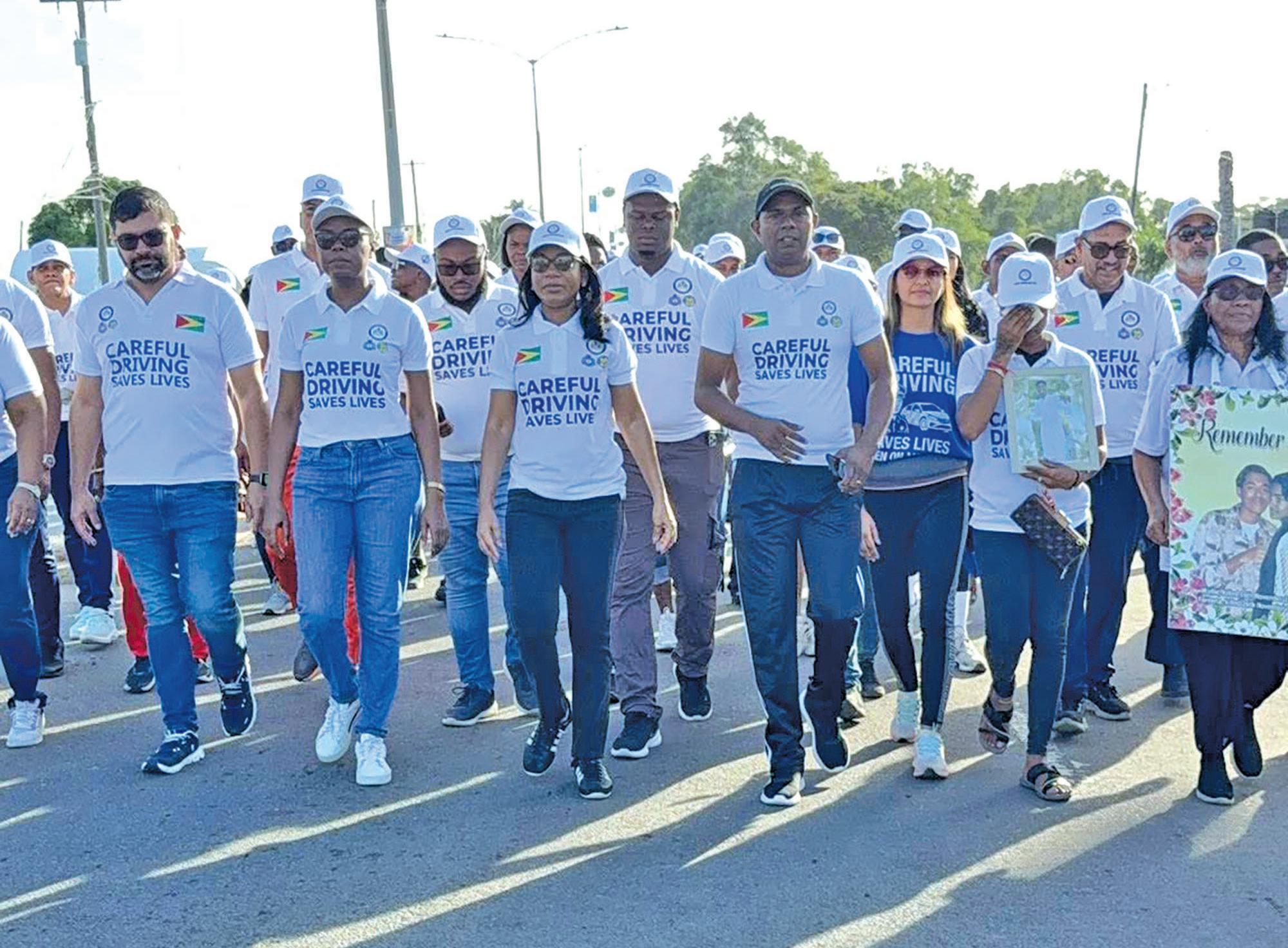
icy and law alone cannot change behaviour. “Policy can guide us, but it cannot drive our actions. Responsibility rests with each individual. Speeding is a choice. Drunk driving is a choice. Using a cell phone while driving is a choice. Impatience is a choice. We all know these things, but we must make the right
choices every time we are on the road,” she said.
She concluded by urging every citizen to reflect on their role in road safety. “Every decision we make behind the wheel, on a motorcycle, or as a pedestrian can impact families, friends, and our own loved ones. The power to prevent accidents lies with all of us,” Minister Walrond said.
Only recently, on November 8 Guyana times reported that Prime Minister (PM) Brigadier (Ret’d) Mark Phillips called on all Guyanese to make road safety a daily practice rather than a once-a-year campaign, noting that more than 640 people have lost their lives on the country’s roadways in the past five years, including 24 children.


Dr Estherine Adams, Head of the Department of History and Caribbean Studies in the Faculty of Education and Humanities at the University of Guyana, has been awarded the prestigious ASSLH Edna Ryan Prize for Best Article on Women’s History (2023–2024) for her groundbreaking study, “‘At Work, in Hospital, or in Gaol’: Women in British Guiana’s Jails, 1838–1917,” published in the Journal of Labour History.
According to the University of Guyana, Dr Adams’s paper presents a powerful and original argument that the prison system in colonial British Guiana was not only a mechanism of punishment but also a tool to extract and control labour, particularly from African and Indian indentured women. The judges praised the article for being “original, clearly positioned in relevant recent literature, and beautifully written to imagine and illuminate the lives of female indentured labourers in British Guiana.” They added that it advanced “an important argument about the centrality of prison labour to the colony, illustrating the intersections of coerced labour, capitalism, and colonialism.”
Dr Adams said she was genuinely stunned to learn that her paper had won the prize, particularly because she had not known it had been submitted. She explained that the journal had entered her article without her prior knowledge, and the notification came as a complete surprise.
Reflecting on the often solitary nature of research—spending long hours in archives and writing late at night—she said learning that her work had resonated strongly with others was both affirming and humbling.
The judges’ comments held special meaning for her, as they recognised not only the academic strength of her research but also its human depth. She noted that the recognition hon-

oured the women whose stories she reconstructed from archival silences, highlighting that her work went beyond research to recover lives erased from history. Her motivation for exploring this subject was guided by a central question: Where were the women in the carceral histories of slavery and indentureship? Dr Adams explained that the prison was one of the earliest colonial institutions designed to regulate and exploit labour, yet women—particularly African and later Indian indentured women—were almost invisible in the archive. She aimed to centre them not as footnotes to male histories, but as labouring subjects whose experiences reveal how power operated through gender, race, and the prison system.
One of her main challenges was the lack of detailed records on incarcerated women. To address this, she employed what she calls a “fragmentary methodology.” In many cases, women appeared only as numbers or anonymous references buried in disciplinary reports. She read against the grain, analysing what the records left out as much as what they included, piecing together details across inventories, health reports, punishment books, and plantation records. “If the archive
whispered, I tried to listen as closely as possible,” she said.
Dr Adams hopes that this international recognition will inspire more researchers in Guyana and across the Caribbean to interrogate history courageously. She said the award signals the value of confronting historical silenc-
es, particularly in colonial archives, and encourages emerging researchers to take risks, ask uncomfortable questions, and challenge dominant narratives. She also reflected on the significance of the award for the University of Guyana. Dr Adams noted that UG scholars juggle teaching, research, and ad-
ministrative duties simultaneously, and that worldclass scholarship can be produced from Guyana for global audiences. She emphasised that the award is shared with her department, her students, and the women whose lives she sought to honour through her research.
The University of
Guyana has congratulated Dr Estherine Adams on her outstanding achievement, stating that her work continues to advance the institution’s mission to contribute meaningfully to national and global scholarship while inspiring future generations of researchers to uncover and honour the untold stories of the region.




Standing before the High Court with family, friends, and mentors at her side, Chelsea Manasseh was on Thursday formally admitted to the Bar of Guyana by Madam Justice Sherdel IsaacsMarcus.
Manasseh was presented by her petitioning attorney, Clevaun Humphrey. Also appearing with her during the petition were attorneys Bernard Da Silva and Jermaine Jervis.
In delivering her admission address to the court, Manasseh described the occasion as one of the most meaningful milestones of her life.
“I stand before you today deeply humbled and profoundly grateful for the opportunity to have my petition heard and my hopeful admission to the Bar.”
She dedicated her
achievement first to her faith, expressing thanks for God’s guidance throughout her legal studies.
“Every challenge, every moment of doubt, and every success was made possible only by His continued favour and mercy.”
Manasseh offered emotional acknowledgements to her parents, whom she credited with sustaining her through the financial and emotional challenges of law school.
“Tuition, rent, and groceries were all covered, and I was never without the support and love of the people who cared for me most.
I will be eternally grateful for the sacrifices you made to make my dreams possible.”
She also thanked her sister for long nights of studying, calling her “one of my biggest driving forces.”

Manasseh expressed deep appreciation for her mentors — Mr. Humphrey and Mr. Jervis — noting that their guidance during her in-service period shaped her understanding of the profession.
“There are so many lessons I have learned under the wings of these two incredible attorneys—lessons I will carry throughout my career.”
She further extended gratitude to Attorney Da Silva and Pernell Cummings for their encouragement and timely support.
Reflecting on her early uncertainty about choosing
a career path, Manasseh said she once feared being tied to one profession for life. It was her mother who first told her she should consider the law, a suggestion she initially doubted. But through university, law school, and practical training, she found clarity.
“I once feared being tied to one thing forever, but I’ve since come to see that law is not one thing at all… And somewhere along the way, I not only learned to appreciate the law—I began to love it.”
She recounted moments where she questioned her path, asking God for signs.
“Every single time I felt
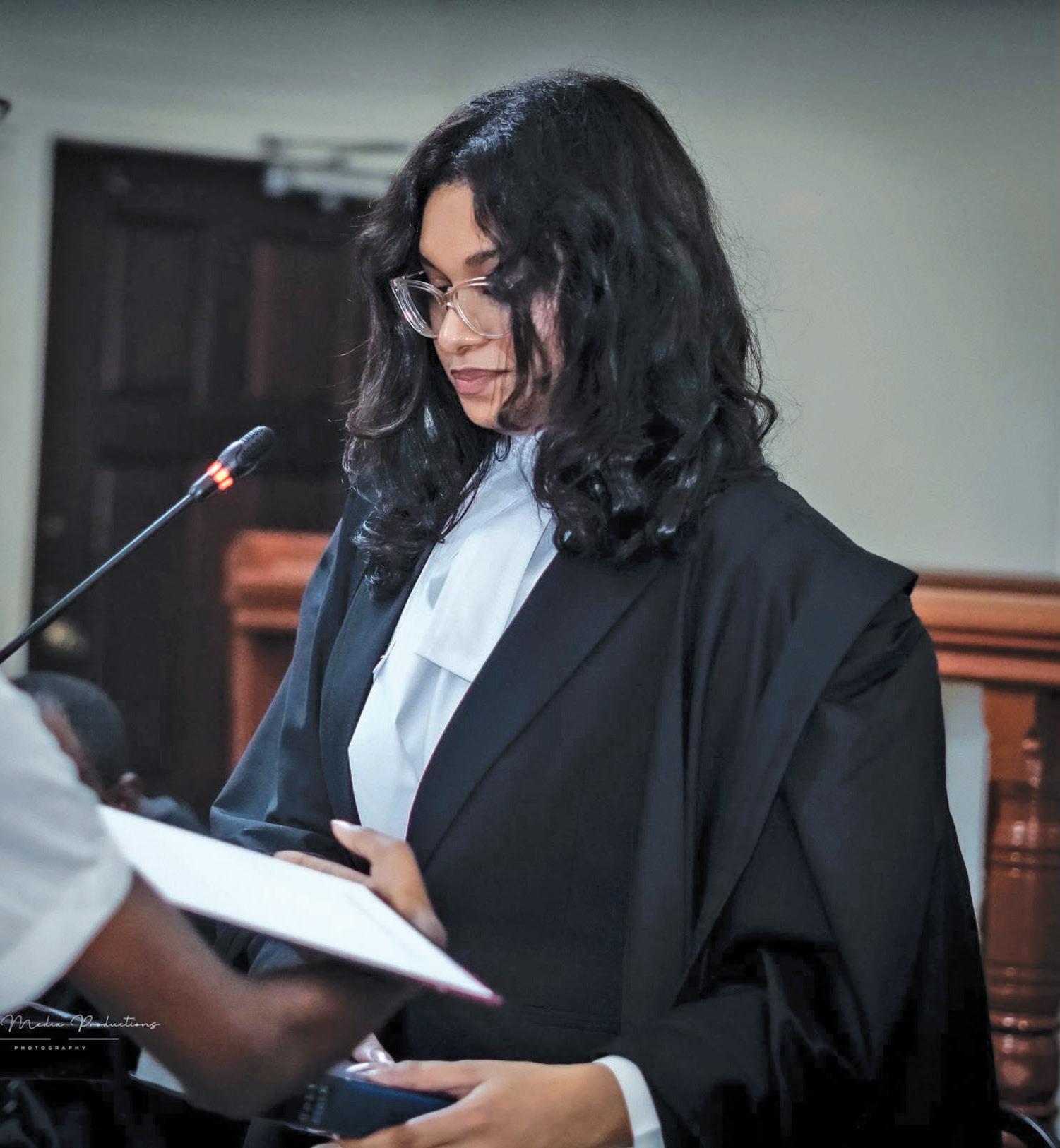
like giving up, somehow, I made it through. Looking back, I can truly say: this must be for me.”
Manasseh, an avid music lover, said her passion for music has helped fuel her personal and academic journey. Quoting the song Superpower from the game Valorant, she noted:
“Today,” she said, “I have leapt, and I am learning to soar.”
In closing, Manasseh pledged to uphold the responsibilities of the legal profession with integrity.
“I promise to serve with humility, diligence, and
fairness, constantly striving to live up to the ideals of this profession.”
She quoted Audrey Hepburn to describe her vision for her legal career:
“You have two hands—one for helping yourself, the other for helping others. Manasseh told the court she intends to use both “in service, to help many, to uphold justice, and to contribute meaningfully to the profession.”
Her petition was then granted by Justice IsaacsMarcus, making November 13, 2025, the official date of her admission to the Bar.
With the Christmas season driving up the demand for beef, Region Six Police Commander, Assistant Commissioner Shivpersaud Bacchus, says law enforcement will intensify efforts to curb cattle rustling across East Berbice–Corentyne.
Speaking on Saturday at the launch of the Region Six Christmas Policing Programme, Bacchus assured that the Police Force will be deploying multiple units—including the Mounted Branch, Marine Section, and regular foot and mobile patrols, to secure vulnerable backlands and grazing areas.
He explained that ranks will be dispatched daily on foot, motorcycles, vehicles, boats, and horseback, particularly in Black Bush Polder, where the Mounted Branch is already active.
“This will be done in the backlands to miti -
gate cattle rustling,” the Commander said.
“You know, at these times, beef will be more in demand. So those cattle rustling activities that are happening in the backlands, the mounted patrol will support on foot, two-wheel and four-wheel patrols from the road. We will be coordinating to have that done, along with marine patrols in the Berbice River and the Canje Creek,” Bacchus explained. Cattle rustling continues to be one of the most serious challenges for livestock farmers in Region Six. The vast savannahs, open pastures and remote backdam trails of areas such as Upper Corentyne, Black Bush Polder, and the Cookrite Savannah enable organised groups to steal and transport animals with relative ease.
Farmers say rustling rings often move cattle at night through isolat -

ed farmlands or transport them by boat, resulting in significant financial losses and fear among ranchers striving to expand the region’s livestock sector.
Meanwhile, the Commander noted that Region Six police will continue to work closely with ranks in Region Five (Mahaica-Berbice) to track rustlers who attempt to move stolen cattle across regional boundaries.
“In the past, we’ve had success with this,” he stated proudly. “Marine patrols intercepted several
cattle rustlers travelling by boat with animals tied on board, taking them from Region Six across to Region Five. Information was received, we intercepted them, and those individuals were charged.”
As the festive season approaches, police say the enhanced coordination of mounted, mobile, and marine operations is expected to serve as a strong deterrent, giving cattle farmers renewed confidence that their livelihoods are being protected.

GuyDrones, Roraima Airways, and Ai Dash formalised a major partnership, signing a landmark Memorandum of Understanding (MoU) during the launch of the new “Drone Dash” initiative.
The three young business leaders from Guyana’s drone, aviation, and service sectors took a bold step on Saturday afternoon when the agreement was formalised during the launch of the “Drone Dash” initiative, held at the Roraima Airways terminal at the Eugene
F. Correia International Airport.
This partnership brings together GuyDrones’ expertise in unmanned aerial vehicles (UAVs), Air Dash’s operational capabilities, and Roraima Airways’ extensive aviation experience to establish a modern drone-enabled delivery network designed to serve communities across Guyana.

Speaking at the launch, Peter Ramsaroop, MP, Chief Investment Officer of Guyana and Agency Head of the Guyana Office for Investment (Office of the President), praised the collaboration as a strong sign of the innovative drive shap-
ing Guyana’s future, led by young leaders who are driving change through their respective areas of expertise.
He noted that the partnership reflects a direction strongly championed by President Dr. Mohamed Irfaan Ali, who has consistently emphasised the importance of businesses working together to deliver solutions that benefit the people of Guyana and support national development.
“As you consider the President’s vision for expanding new technologies, services, and infrastructure, from upgrading the Brazil connection, the Berbice expansion, and the Wales de-
velopment to the enhancement of port facilities, this collaboration adds a new layer of transport designed to ensure the faster, smarter, and more reliable movement of essential goods across both coastal and hinterland regions.”
Also in attendance were Vice President of GuyDrones, Ershad Mahamad; Chief Executive Officer of Air Dash, Dennis Dash; Director of Roraima Airways, Gerald Gouveia Jr.; and Country Manager and UAV Pilot of GuyDrones, Rowan Singh.
Three vendors were on Friday brought before the Georgetown Magistrates’ Courts to answer charges stemming from an altercation along Arapaima Street, Georgetown. The defendants, Dave Vandahm, Jumar Wickham, and Kimberly DaSilva, appeared before Acting Chief Magistrate Faith McGusty, where each pleaded not guilty to the offences laid against them. According to the charges, Jumar Wickham is accused of unlawfully assaulting Kimberly DaSilva on November 6, 2025, at Arapaima Street. He is further alleged to have
damaged one stand valued at $20,000, the property of DaSilva.
DaSilva, meanwhile, was charged with unlawfully assaulting Wickham on the same date and location. A separate charge was also brought against Dave Vandahm, who is accused of assaulting Wickham during the incident.
The prosecutor told the court he had no objections to bail, but noted that he is in possession of a medical report and requested a no-contact order among the three defendants. During the proceedings, Wickham told the court that he believes the police are biased

in favour of DaSilva and Vandahm, alleging that officers regularly visit their stalls to “buy drinks and smoke.” He claimed that on


the day of the incident he was “banked” by three persons and that he was the

individual who sustained the chops referenced in the medical report. Magistrate
McGusty granted $20,000 bail each to Wickham and Vandahm, while DaSilva was granted $10,000 bail. All three were also placed on a bond to keep the peace, with the Magistrate warning that any breach could result in them being remanded until trial.
Addressing Wickham’s allegations of police bias, Magistrate McGusty advised that if he believes officers acted improperly, he may file a complaint with the Police Complaints Authority. The matter was adjourned until November 28.


Following a productive stakeholder meeting on November 14, 2025, Recover Guyana and representatives of Queen’s College finalised key strategies to advance the student-initiated Cycle Smart Project, moving the school one step closer to strengthening its environmental sustainability efforts.
Members of Recover Guyana met at the school with Donna Lewis-Isles, Head Teacher of Queens College; teacher Dianne Henry, and SHOUT 3.0 winner Anushka Singh for a highly productive meeting that centred on the next steps in implementing the Queens College Cycle Smart Project which was pitched by Singh during the SHOUT 3.0 Competition in June 2025.
The meeting concluded with a set of well-defined strategies and agreed-upon next steps for implementa-

tion. All parties expressed confidence that the Queens College Cycle Smart Project will become a model for environmental stewardship, fostering long-term behavioural change and a strong culture of sustainability within the school community.
A site visit was also conducted at the school’s Kitchen Garden Hydroponics and the Water Purification Systems implemented by SHOUT winners Gabriella Arjune and Vasanna Persaud respectively. In the spirit of collaboration, Recover Guyana pledged its continued support by way of a donation to the Agricultural Science Department.
The Queens College Cycle Smart Project is a recent environmental initiative in Guyana that aims to foster a culture of sustainability through cycling. The project was a winning pitch
during the SHOUT 3.0 Competition in June 2025 by Anushka Singh.
On November 14, 2025, members of Recover Guyana, an environmental non-profit organisation, met with the Queen's College head teacher and other stakeholders to plan the next steps for the project's implementation.
The parties involved expressed confidence that the project will serve as a model for environmental stewardship and promote long-term behavioural change within the school community.
Recover Guyana has pledged continued support, including a donation to the school's Agricultural Science Department.
While the "Cycle Smart" project is a specific schoolbased initiative, Guyana has several national "smart" projects in various sectors, often focused on technology and climate resilience:
A20-year-old Durban Backlands labourer, who is no stranger to the court system, was on Friday remanded after being slapped with two counts of robbery under arms.
The accused, Antonio Lawrence, appeared before
Acting Chief Magistrate Faith McGusty at the Georgetown Magistrates’ Courts. Lawrence was not required to plead, as the charges are indictable.
According to the allegations, on Sunday, November 9, 2025, at Lot 1 Mandela
Avenue, Georgetown, Lawrence, while said to be in the company of others and armed with a gun, allegedly robbed Li Xiang of $500,000 cash. On that same date, and again reportedly in the company of others and armed with a gun, he is accused of


robbing Mikhail Santana of a Samsung cellphone.
Lawrence’s attorney told the court that his client is a labourer and claimed that he has “no antecedents.” He argued that Lawrence is not a flight risk and would comply with any conditions imposed by the court if bail were granted.
The prosecutor strongly objected to bail, emphasising that a firearm was al-
legedly used in the commission of both robberies. He said he was concerned with protecting public safety, especially as the country enters the busy holiday season. The prosecutor further highlighted the serious nature of the offences, the value of the items taken, and noted that the accused had been positively identified by both virtual complainants.
Acting Chief Magistrate McGusty refused bail, citing the allegations involving the use of a gun and the seriousness of the offences. She stressed the need for public safety during the upcoming Christmas period and remanded Lawrence to prison until December 5, when the matter will be called again.
Lawrence is not unfamiliar with the court. Earlier this year, in May 2025, he was among several men charged with terrorism and related offences following violent unrest in Georgetown after the death of 11-yearold Adrianna Younge. The men were initially remand-
ed to prison, but in another court appearance, Principal Magistrate Faith McGusty granted the accused bail, including Lawrence, despite strong objections from the prosecution at the time. The men had faced a range of allegations, including terrorism, break and enter, theft, and destruction of property. Surveillance footage had played a major role in the arrests, capturing acts of arson, looting, and road blockages in areas such as Albouystown, Cemetery Road, Hunter Street and Tucville.
Lawrence, who was then 19, was one of the individuals granted bail on terrorism charges and was ordered to return to court in early June. It is unclear what occurred on that date.
His latest charges now place him once again before the Georgetown Magistrates’ Courts, this time facing serious robbery under arms allegations that the prosecution argues pose a direct threat to public safety.


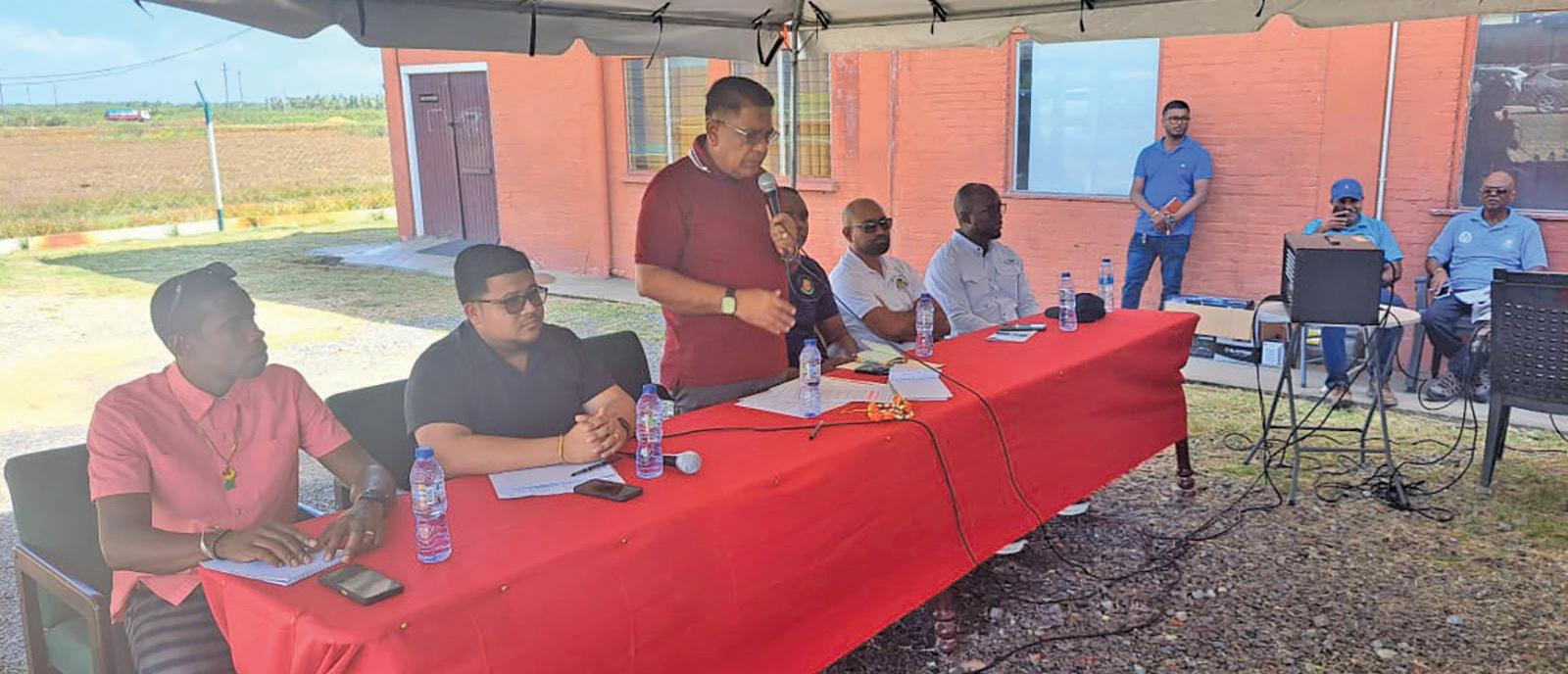
Agriculture Minister
Zulfikar Mustapha met rice, livestock, and cash-crop farmers on Saturday at Onverwagt, West Coast Berbice, where he outlined Government’s massive push in the sector.
He also insisted that farmers must adjust their practices and help lower production costs if Guyana is to remain competitive on the world market, while reiterating Government’s commitment to continue “rescuing” farmers in times of crisis.
“We have to collectively work to bring down the cost of production. If we can’t bring down the cost of production, we can’t survive in this world,” he cautioned.
One of the key issues he highlighted is the widespread practice of subletting lands leased from the Mahaica-Mahaicony-Abary (MMA) Scheme at high rates, with some leaseholders treating the land as a “commercial business” instead of cultivating it themselves.
He reminded the gath-
ering that the previous Government had increased land rental and drainage and irrigation charges from $3500 to $15,000 per acre, forcing many farmers out of cultivation. The People’s Progressive Party/Civic (PPP/C), he said, reversed that decision soon after taking office and reduced the rate back to $3500, yet many leaseholders still owe large amounts.
Quoting from the standard MMA lease, Mustapha stressed that subletting without written consent is prohibited and disclosed that he is preparing a policy paper for Cabinet to address the issue, including outstanding rentals and land disputes in the scheme.
“Let’s stop those things,” he urged, promising to spend an entire day in the region with the MMA board to help resolve land problems.
Development
Mustapha said the Government’s objective is to position Guyana as the number one food-producing
country in Caricom, noting that the regional bloc cannot achieve its target of cutting its food import bill by 25 per cent without Guyana’s success.
“We have abundant fresh water, and we have flat and arable land. The job for us now is to harness those potentials that we have,” he stressed.
The Minister reminded farmers that Region Five has been earmarked as the “livestock capital” of the Caribbean. He pointed to the Black Belly sheep initiative launched by President Dr Irfaan Ali at Onverwagt, in partnership with Barbados, through which Guyana received 1000 sheep to help build a new brand of mutton for regional and international markets.
“Today, over 500 farmers have benefited from that programme,” Mustapha reported, adding that the Government has developed a 65-acre plot for small ruminant farmers to graze their animals, with more extensive development planned in other parts of the
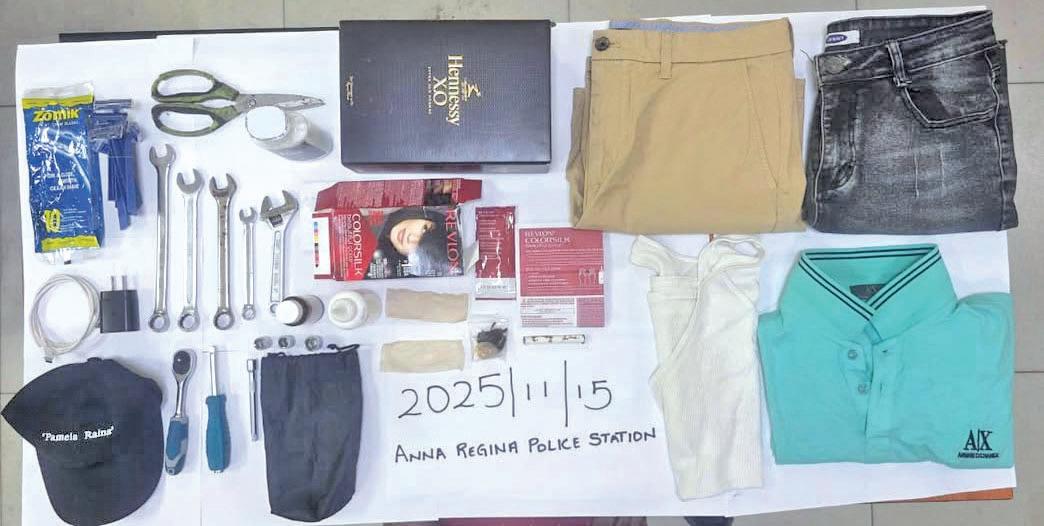
Items being assessed as investigations continue
Police in Regional Division # 2 are investigating an alleged break and enter and larceny committed on the dwelling house of a 51-year-old businessman of Hampton Court, Essequibo Coast that occurred Saturday, November 15.
Initial investigations revealed that a window on the lower flat was prised open and entry is believed to have been gained through that point. The interior of the home was found ransacked. Several items of clothing and other personal effects were discovered outside
near the compromised window and were lodged at the Anna Regina Police Station.
An undisclosed quantity of items and their value are being assessed and will be determined later.
Police are currently reviewing CCTV footage in the ongoing probe.
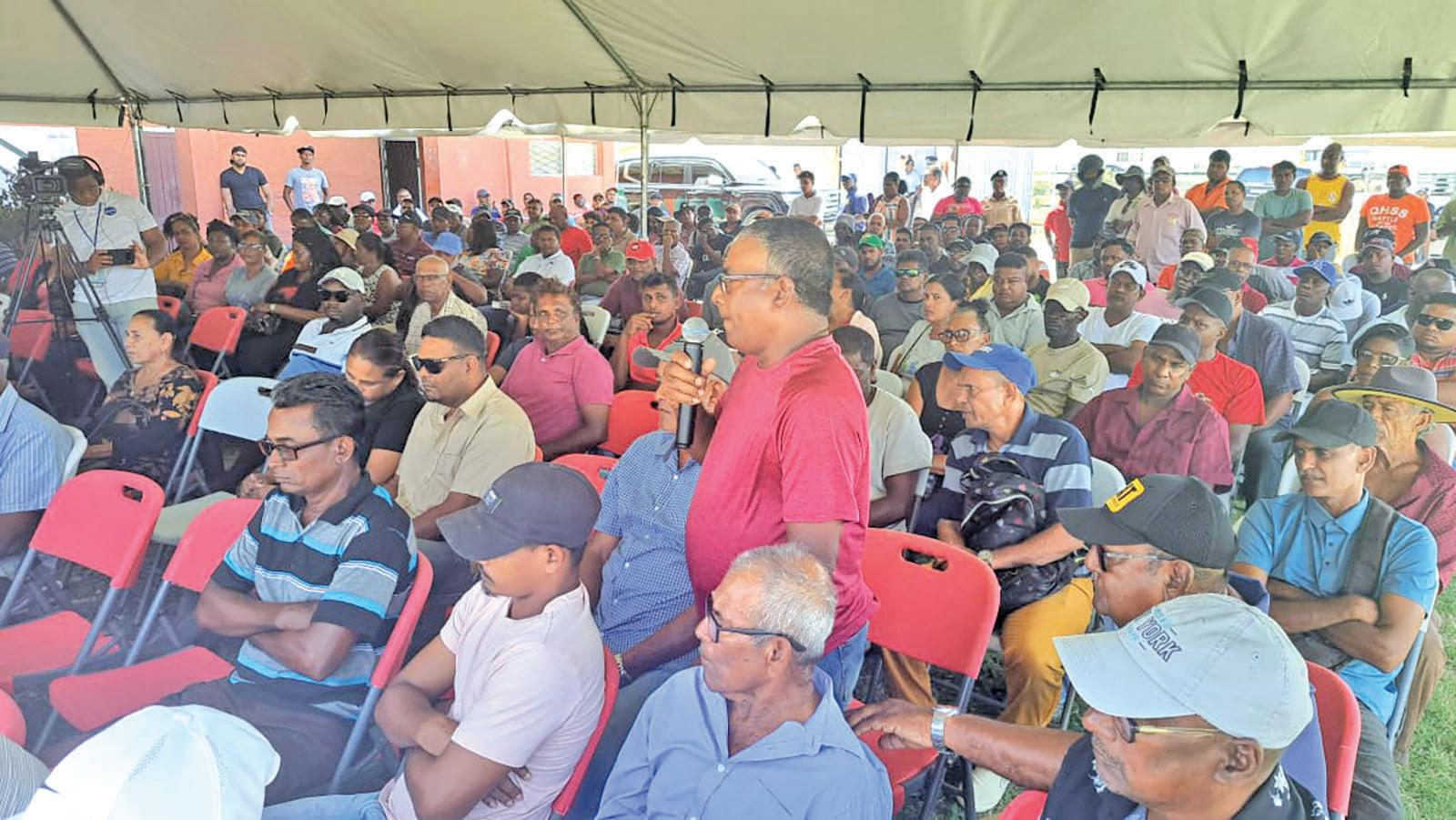
The meeting also featured an interactive session region.
He urged rice farmers not to view livestock development as separate from their own interests. “When development takes place in the livestock sector, it will help you too. It will bring more revenue into the country, and you can get a better price for your paddy,” he told them.
Mustapha also announced that President Ali was expected in the region shortly to commission the new stateof-the-art abattoir, which will facilitate more scientific slaughtering of cattle and other animals and is expected to serve the wider country.
The Minister outlined several ongoing and planned infrastructure projects aimed at reducing flooding and supporting expanded production.
He also highlighted the prawns project at Onverwagt, where a model farm and hatchery are being developed to supply larvae for ponds and support large-scale aquaculture investment. The Government is additionally examining the construction of brackish water shrimp ponds along the coast.
“Region Five is slated for massive development,” Mustapha declared, pointing as well to the national food hub being constructed on the Linden-Soesdyke Highway with a US$12 million cold storage component.
Turning to the rice industry, the Agriculture Minister said Guyana produced a record 725,000 tonnes of rice last year and was on track to produce between 810,000 and 820,000 tonnes this year, as the country worked towards a 2030 target of 1.2 million tonnes.
He acknowledged that some Region Five farmers experienced low yields in the last crop, but said the Agriculture Ministry and the Guyana Rice Development Board (GRDB) will work closely with them “to get back that yield increased tremendously next crop.”
The Minister remind-
ed farmers that Government has repeatedly intervened to support the industry, including absorbing VAT and taxes on agricultural inputs and machinery, providing free or subsidised fertiliser and seed paddy, and granting a $300-per-bag top-up on paddy prices last crop – an initiative that placed some $1.9 billion directly into rice farmers’ pockets. He noted that 150,000 bags of fertiliser, worth more than $970 million, were distributed in Region Five alone to rice and cash-crop farmers.
He also flagged Government’s plan to establish a development bank for agriculture that would provide interest-free loans, freeing farmers from having to rely on millers for advance financing and then being tied to selling paddy to specific mills.
“That will be a game changer for the industry,” he said.
Mustapha further urged every rice farmer to enrol in the new crop insurance scheme that covers losses from flood or drought, with the State paying the insurance premium. “It is your benefit,” he emphasised, warning that those who refuse to join
now should not expect compensation later.
Despite temporary setbacks such as the recent yield decline, Mustapha said the PPP/C Administration remained firmly committed to farmers and to the transformation of the sector.
“You are not hearing that this government is saying rice is a private business, and you must go and look for yourself. Every time there’s a crisis in this sector, especially the rice industry, we try and come and rescue the rice farmers. That’s the hallmark of this government, and we will continue to do that,” he told the meeting. He urged farmers to work with the Ministry and other agencies as the Administration accelerated its agenda to modernise agriculture, increase value-added production, and ensure Guyana’s position as the Region’s leading food producer.
“Let us work together. We have started something in 2020, and we will continue more aggressively. In these five years, as the President said, we have to do 15 years’ work, and you are already seeing the transformation taking place,” the Minister appealed.

AJamaican man extradited to the United States to face fraud charges has been ordered detained pending trial for allegedly orchestrating a multi-million dollar lottery scam that defrauded an elderly American woman of more than US$800,000.
US Attorney Charles Neil Floyd announced that 34-year-old Roshard Andrew Carty was returned to the Western District of Washington on October 23, 2025 following his August 21 arrest in Jamaica.
On Wednesday, November 12, Magistrate Judge David W. Christal ruled that Carty will remain in custody until his trial, which is set for December 22, 2025.
According to court documents, Carty first contacted his 73-year-old victim in 2020, claiming she had won
a US$22 million Publishers Clearing House prize.
For the next three and a half years, between August 2020 and February 2024, he allegedly convinced her to send more than US$800,000 in supposed taxes, fees and other costs needed to claim the fictitious winnings.
Prosecutors say Carty repeatedly manipulated the victim, at one point, falsely telling her that the FBI was monitoring their calls and that she should not disclose the win to anyone.
His requests for money escalated over time.
He allegedly urged her to withdraw smaller amounts of cash to send via FedEx, then later told her the funds had been lost or stolen and demanded more.
Investigators say Carty also persuaded the victim to borrow against her home and ultimately to sell the
property to continue sending him money.
The funds were mailed to various couriers in the United States.
The indictment further alleges that Carty was relentless, bombarding the victim with calls and text messages from different numbers.
When she attempted to cut off contact, he allegedly sent tow trucks and pizza deliveries to her home and even contacted her landlord requesting a welfare check, all in attempts to re-engage her.
Carty was indicted in November 2024, and after being taken into custody in Jamaica last August; he consented to extradition.
He faces four counts of wire fraud and four counts of mail fraud, each punishable by up to 20 years in prison.
(Radio Jamaica Online)
Caribbean reparations leaders in
Adelegation from the body leading the Caribbean’s slavery reparations movement will be in the UK next week for a “historic” first official visit to advocate for former British colonies.
The Caricom Reparations Commission (CRC) will be meeting with UK parliamentarians, Caribbean diplomats, academics and civil society groups from 17 to 20 November.
Organised in collaboration with the Institute of Commonwealth Studies, the visit aims to strengthen strategic partnerships and increase public knowledge about the region’s colonial past and its reparations movements.
Between the 15th and the 19th century, more than 12.5 million Africans were kidnapped, forcibly transported to the Americas and sold into slavery.
Caribbean governments have been calling for recognition of the lasting legacy of colonialism and enslavement, and for reparative justice from former colonisers, including a full formal apology and forms of financial reparations.
Prof Sir Hilary Beckles, the CRC chair who is leading the six-member delegation, said the visit would help to amplify and advance the Caribbean’s pursuit of reparatory justice. The issue of reparations
for transatlantic slavery has been heating up, dominating headlines during last year’s Commonwealth leaders’ summit when the British government ruled out paying reparations or issuing a formal apology for the UK’s role in the transatlantic slave trade.
The UK government, under pressure from Commonwealth leaders to engage in a “meaningful, truthful and respectful” conversation about Britain’s past, later opened the door to discussing non-financial reparations, such as restructuring financial institutions and providing debt relief for the UK’s role in the transatlantic enslavement. (Excerpt from The Guardian)
Thousands of people have rallied across Mexico, protesting against growing crime, corruption and impunity, in demonstrations that were organised by members of Generation Z.
The marches on Saturday were attended by people from several age groups, including older activists from opposition parties, as well as supporters of the slain Michoacan Mayor Carlos Manzo, who was who was shot dead at a public Day of the Dead event earlier this month.
In Mexico City, a small group of hooded protesters tore down fences around the National Palace where President Claudia Sheinbaum lives, prompting a clash with riot police who deployed tear gas, according to media reports.


Ecuador has arrested the leader of one of the country's biggest drug trafficking gangs, Los Lobos, in an operation with Spanish police, President Daniel Noboa said on Sunday.
Wilmer Geovanny Chavarria Barre, known as "Pipo," helms a powerful group that the U.S. in September designated a foreign terrorist organization, along with its rival, Los Choneros.
Noboa said Chavarria had controlled illegal mining operations and drug routes with Mexico's Jalisco New Generation Cartel, and had faked his death, changed his identity and hidden in Europe while ordering murders in Ecuador.
"Some gave him up for dead; we searched for him in his very own hell," Noboa said in a social media post, thanking the Spanish po-

lice for collaborating on a capture that Ecuador's police chief said took place in Malaga.
Interior Minister John Reimberg said in a separate social media post that Chavarria was responsible for at least 400 deaths, and had managed criminal operations from prison between 2011 and 2019.
Noboa has pursued a militarization strategy to crack down on worsening gang violence in a country that was once considered one of the safest in Latin America. Analysts say the capture of ringleaders has sparked more violence and killings as criminal groups battle for power. (Excerpt from Reuters)
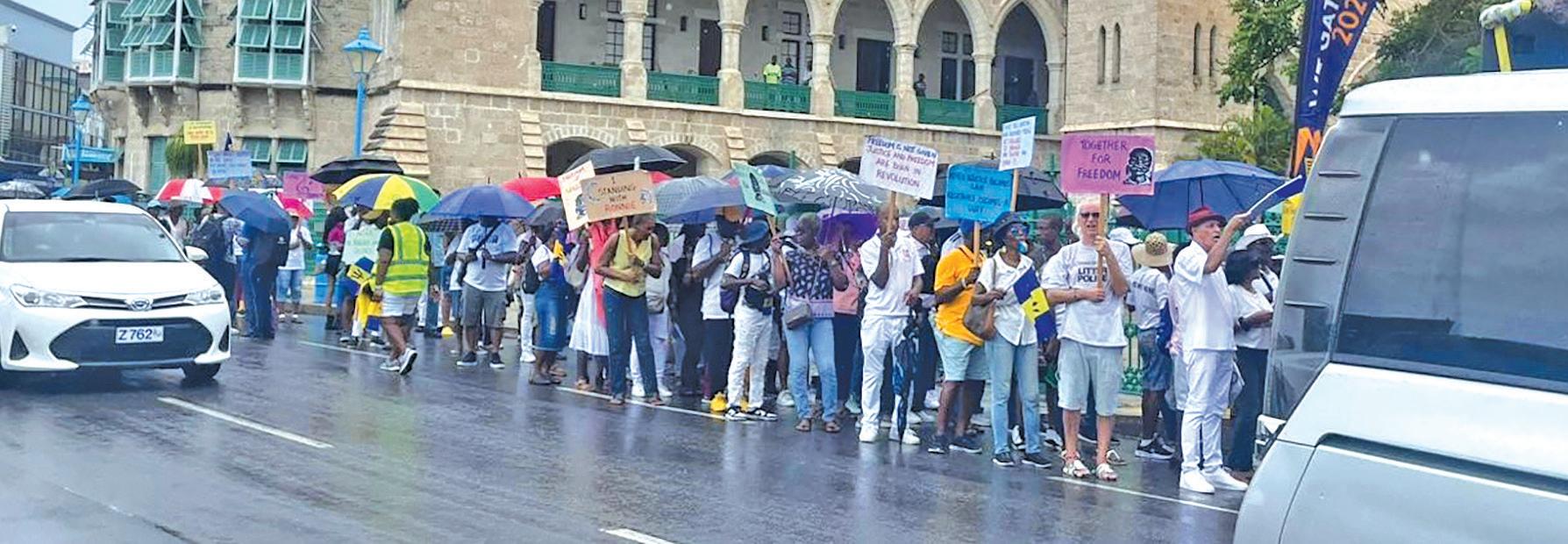
Scores of Barbadians took to the streets on Saturday in support of veteran broadcaster and entertainer Ronnie De Announcer Clarke, who was recently dismissed by Starcom Network Inc.
According to Starcom, Clarke was dismissed following a formal disciplinary process relating to internal company matters. The Network has denied that Clarke’s dismissal was linked to his performance of a controversial calypso during this year’s Pic-O-DeCrop competition
Saturday’s march called for transparency, support for artistic expression and appeals for national unity.
Speakers stressed that the
issue extended far beyond any single artist.
With Clarke’s controversial National Carol Festival song and other calypsos blaring from speakers under overcast skies, the march from Kensington Mall to Independence Square in The City attracted people from all walks of life.
Some placards read, ‘Sing Ronnie, Sing!’, ‘We walk for all those who are scared to walk’, and ‘When injustice becomes law, resistance becomes duty’, as passers-by cheered them on.
President of the Barbados Association of Creatives and Artistes (BACA), Sean “Apache” Carter, described Clarke as “one of the best
broadcasters the country has ever seen.” Carter insisted that “freedom of expression and artistic expression is not an option, it is a must”. Artistic work, he argued, is central to national identity: “It is who we are.” If creators are suppressed, he warned, the entire industry will suffer.
However, Carter made it clear that the call for artistic freedom was not a push for unlimited licence. “It is not about giving rights to artists to do and say anything. There are already laws that govern that. Instead, the concern is unjust suppression and unjust victimisation, which we cannot stand for,” he said. (Source: Barbados Today)
Another 20 civilians were also injured, Vazquez told local media outlet Milenio.
The public safety secretary also said 20 people were arrested and another 20 “referred for administrative offences”.
According to El Universal, a Mexican news
Mexico City’s public safety secretary, Pablo Vazquez, said in a news conference that 100 police officers were injured, including 40 who required hospital treatment.
outlet, security forces fired tear gas and threw stones at protesters as they entered the perimeter of the National Palace.
The protest was organised by a group calling itself “Generation Z Mexico”. It said in a “manifesto” circulating on social media that it is non-partisan and represents Mexican youth that are fed up with violence, corruption and abuse of power.
(Excerpt from Al Jazeera)
THE Customs and Excise Division has seized over $11 million worth of marijuana and Methylenedioxymethamphetamine (MDMA), commonly known as ecstasy or molly, in four separate interceptions over the last week.
A November 15 release said the operations resulted in the seizure of 38.998 kilogrammes of marijuana, eight ampoules of fentanyl, one vial of ketamine, and 0.606
kg of MDMA. The estimated street value of the marijuana is $9,737,800, while the MDMA carries an estimated street value of $1,515,000.
It said several people were arrested in relation to these seizures and have since appeared before the magistrates' court, but investigations are ongoing.
No further details were provided.
(Source: Trinidad & Tobago Newsday)

India's federal anti-terror agency said on Sunday it had arrested a resident of Kashmir who it accused of conspiring with the driver of a car that exploded in Delhi last week, killing eight people and wounding at least 20 others.
The National Investigation Agency said it had arrested Amir Rashid Ali in Delhi, adding the car used in the attack was registered in his name. It ac-
cused Ali of conspiring with the alleged suicide bomber, who it identified as Umar Un Nabi, a resident of south Kashmir's Pulwama district.
It said Ali came to Delhi to facilitate the purchase of the car which was used as a "vehicle-borne Improvised Explosive Device to trigger the blast."
The agency said it had seized another vehicle belonging to Nabi for exam-
ination. So far, it has interrogated 73 witnesses including those injured in the blast.
Last week, the Indian government said it was treating the car blast as a "terror incident" and vowed to bring the perpetrators to justice as swiftly as possible.
The blast outside Delhi's historic Red Fort was the first such explosion in the heavily guarded city since 2011. (Reuters)
The United States conducted another attack on an alleged drug trafficking boat in the eastern Pacific on Saturday, killing three people aboard, the Pentagon said on Sunday.
"Intelligence confirmed that the vessel was involved in illicit narcotics smuggling, transiting along a known narco-trafficking route, and carrying narcotics," the U.S. Southern Command announced in a post on social media. The announcement said the boat was in international waters when it was struck by Joint
Task Force Southern Spear. It was the 21st known attack on drug boats by the U.S. military since early September in what it has called a justified effort to disrupt the flow of narcotics into the United States. The strikes have killed more than 80 people, according to Pentagon figures.
Also on Sunday, Secretary of State Marco Rubio said the State Department would designate an alleged drug organization, Cartel de los Soles, as a "foreign terrorist organization," which makes it a crime for anyone
in the United States to provide material support to the group. U.S. officials have accused Cartel de los Soles of working with the criminal organization Tren de Aragua to send narcotics to the United States.
The Trump administration has said Venezuelan President Nicolás Maduro leads Cartel de Los Soles, which he denies. The Pentagon has deployed warships, fighter jets and a nuclear submarine to the Caribbean as U.S. officials consider taking military action against the Maduro government. (Reuters)
Around 30 people were killed at a semi-industrial copper mine in southeastern Congo on Saturday after a bridge collapsed, the country's artisanal mining agency said.
An agency official told Reuters there were 49 deaths and 20 people had been taken to hospital in a critical condition as a result of the incident, which occurred on Saturday at the Kalando mining site in Lualaba province.
The collapse was "caused by panic, reportedly triggered by gunfire from military personnel securing the site," said Congo's Artisanal and Small-Scale Mining Support and Guidance Service, known by its French acronym SAEMAPE.
Miners then "piled on top of each other, causing injuries and death", SAEMAPE added in a statement on Sunday.
The Initiative for the Protection of Human Rights called for an independent investigation into the military's role in the deaths, citing reports of clashes between miners and soldiers.
A military spokesperson did not immediately respond to a request for comment.
Roy Kaumba, the provincial interior minister, said in a televised statement that 32 people had been confirmed dead. (Excerpt from Reuters)
Republican lawmaker
Marjorie Taylor Greene has accused United States President Donald Trump of putting her life in danger, saying his online criticism has triggered a wave of threats against her. Greene, once a longtime Trump loyalist who has more recently taken positions at odds with the president, on Saturday said she has been contacted by private security firms warning about her safety.
“Aggressive rhetoric attacking me has historically led to death threats and multiple convictions of men who
were radicalised by the same type [of] rhetoric being directed at me right now,” Greene, a House of Representatives member from Georgia, posted on X.
“This time by the President of the United States.”
The White House has not yet responded to her post.
Trump broke off with Greene, 51, on Friday night in a withering social media post, in which he referred to Greene as “wacky” and a “ranting lunatic” who complained he would not take her calls.
He continued his criticism on Saturday with two more social media posts,
Iranian authorities maintain that the United States and its allies are set on a forceful approach over the country’s nuclear programme, so negotiations appear far off.
The administration of US President Donald Trump has left no room for talks by repeatedly presenting “maximalist demands”, Iranian Foreign Minister Abbas Araghchi said on Sunday at a news conference in Tehran.
“The current approach of the US government in no way shows readiness for an equal and fair negotiation to secure mutual interests,” he said on the sidelines of the state-organised Tehran Dialogue Forum, which diplomats and envoys from across the region attended.
Iranian officials said they have been receiving messages from neighbouring countries that are trying to mediate and keep the peace.
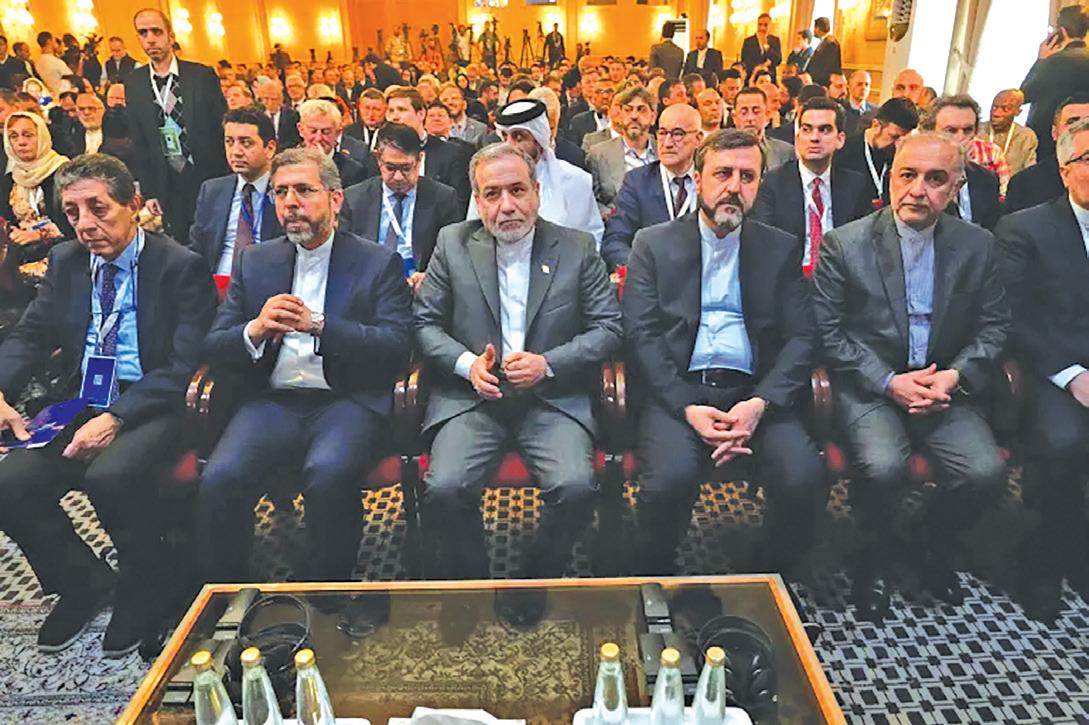
Araghchi said communication channels remain open with the International Atomic Energy Agency (IAEA) as well. Iran’s envoy to Vienna, where the nuclear watchdog is based, was joined on Friday by counterparts from China and Russia in a meeting with the representatives of the United Nations agency.
“There’s no enrichment right now because our nuclear enrichment facilities have been attacked,” the foreign minister said at the news conference. “Our message is clear: Iran’s right for peaceful use of nuclear energy, including enrichment, is undeniable, and we will continue to exercise it.”(Excerpt from Al Jazeera)
YouTuber Jack Doherty was arrested on drug possession and other charges in the Miami area in the early hours of Saturday morning, police said.
The influencer was filming video content while attempting to engage with police officers in the middle of the road, blocking traffic in the process, according to arrest documents published by US media.
He was then apprehended, before a police search found "half of an orange oval-shaped pill with 3 imprinted on it, consistent with a Schedule II amphetamine", and three "suspect-

ed cannabis cigarettes".
The 22-year-old is known for filming provocative vid-
eos involving pranks, with titles like "I got kicked off a cruise" and "I crashed into a cop car".
He is also known for videos in which he provokes strangers on the street, before hiding behind his bodyguard.
He has more than 15 million subscribers on YouTube, over 10 million followers on TikTok and more than 2.8 million followers on Instagram. It is unclear if Mr Doherty has a lawyer. A representative listed on his social media did not immediately respond to a request for comment. (Excerpt from BBC News)
Hundreds of East Sussex residents in England have protested against plans to house male asylum seekers in an Army barracks on the edge of their town.
calling her a “lightweight Congresswoman”, a “traitor”, and a “disgrace” to the Republican Party.
On Saturday, Greene wrote that she now has a “small understanding” of the fear and pressure felt by the victims of Epstein, who died by suicide in a jail cell in 2019.
On Wednesday, Greene was one of only four House Republicans who joined Democrats in signing a petition to force a vote on releasing the full Justice Department files related to Epstein, as the scandal once again ensnares Trump. (Excerpt from Al Jazeera)
Last month, the Government announced that 600 asylum seekers would be temporarily housed at Crowborough Training Camp, in East Sussex.
In a letter to the Home Office on Friday, Trevor Scott, the chief executive of Wealden district council, wrote that there was “considerable concern” amongst residents about how the change in use of the site would affect local facilities.
The council has previously called for the reversal of the plans, claiming the Home Office had “total-

ly failed” to engage with the community or provide assurances around safeguarding.
The decision to house asylum seekers at the site prompted a march on the site on Sunday, attended by hundreds of protesters who demanded that the plan was dropped.
It followed a meeting on Thursday night at which local politicians were heckled by members of the public. Asylum seekers are expected to begin moving into the camp before the end of the month.
(Excerpt from The Telegraph)

















Use your imagination and rethink your next professional or financial move. Stay ahead, engage in what’s coming down the pipeline and learn how you can market your skills to ensure you flourish.
















Refuse to let emotions stand between you and what you want. An innovative and dedicated approach to your next move will pave the way to greater opportunities.
Speak up, ask questions and dedicate time and ingenuity to fine-tuning how you move forward. Change can offer opportunities that give you a unique view of what’s possible.
Take the initiative to participate in something that interests you. A new look will be uplifting and encourage you to make the first move when you encounter someone intriguing.
Think matters through before making changes or a move that can disrupt your household. Address emotional issues directly, and you’ll gain insight into what’s possible.
Do what comes naturally and what you do best, and success will be yours. Display your skills physically and give others a chance to see firsthand the potential of what you have to offer.
Simplify your life. Take a moment to rearrange your day to ensure you address what’s essential to you and your future. Target your goal and focus on results.
Diversify and see what happens. Taking the road less traveled will be eye-opening. You are overdue for a change that stimulates your mind and encourages greater confidence.
Adjust your living quarters to suit your needs. It’s time to broaden your awareness regarding money and health issues to ensure you make the headway necessary to sustain your momentum. Embrace change.


Put your energy where it brings the highest return. Discipline, hard work and creative input will raise eyebrows and encourage others to take note of what you are doing.



Put more thought into how you can outdo anyone trying to compete with you. Preparation is vital, along with executing your skills with precision and passion.

It’s what you do that counts. Don’t waste time forcing your wants on others. Instead, take the initiative to move forward, and let your achievements speak for themselves.









South Africa started the day staring at defeat, only 63 ahead with three wickets in hand, but registered a stunning win, their first in India in 15 years and the second-smallest successful defence in Asia. The whooping and cheering among the South Africa players echoed amid a shocked Sunday crowd at Eden Gardens as the visitors bowled India out for 93 in the absence of their injured captain Shubman Gill.
Temba Bavuma was ever present, scoring the only half-century of the match and taking South Africa to a formidable lead of 123 on a pitch with extravagant sideways movement and variance in bounce. He was helped a little by some ordinary spin bowling on the third morning, but he had earned the errors after defending resolutely on the second evening.
The target of 124 was always going to be tricky with Simon Harmer outbowling India's spinners in the country where he had a forgettable tour in 2015-16. The uneven bounce made Marco Jansen a handful, causing the double jeopardy you need to defend small totals.
India began the day in the ascendance, but not
with bowlers likeliest to take a wicket. Axar Patel opening the day was a surprise, and as the singles flowed with ease you could sense panic. Rishabh Pant, who had been excellent with his rotation of bowlers and field placements on the second evening, began to change bowlers too quickly and also took a desperate review against Bavuma when Ravindra Jadeja had clearly pitched outside leg from over the wicket.
That Jadeja was bowling over the wicket in itself was a sign of desperation when all you really needed to do on this surface was bowl a good length and shut the scoring. Jadeja, who until day two was the best player of the match, just struggled to maintain that length and bowled seven overs for 21 runs. Washington Sundar, one of the three spinners in the last four home Tests, was not used at all.
Bavuma's defence found an ally in Corbin Bosch's big hits, which he deployed mainly against Kuldeep Yadav. The two added an invaluable 44 for the eighth wicket, 25 of which came off Bosch's bat. Eventually it was the fast bowlers that kept India alive. Jasprit Bumrah hit the top of
Bosch's off, and Mohammed Siraj, in only his second over of the innings, got the better of Harmer and Keshav Maharaj with reverse swing.
It was always going to be a tough target on this pitch, but India had hope in South Africa's selection of only two spinners, one of whom, Maharaj, had gone for 161-66-1 in the first innings. Jansen, though, stunned them at the start in his first two overs to send back the openers. Both these balls jumped off a length, got big on the batters, and took the outside edge.
Washington, India's newest number three, played resolutely again, mirroring the first half of Bavuma's innings and facing the most balls in the match, but as it tends to happen on these pitches, Dhruv Jurel put a long hop into the hands of deep midwicket. The ball did stop on him as it tends to happen on these pitches.
Harmer might have got on the board with this fortunate wicket, but he bowled beautifully to earn that stroke of luck. Ten years after a crushing tour of India, he is back a much-improved bowler. He could change his trajectory subtly, most of the times able to bowl a good length at different paces. It


showed in how he completely tied up the most dangerous batter in the India lineup, Pant, and eventually earned a return catch with dip and turn.
At 38 for 4, Washington and Jadeja added 26 runs, looked comfortable, but this is when Jadeja's old-school method of defending with the bat behind the pad came back to haunt him. Just like in the first innings. Once again out lbw pad-first to Harmer, Jadeja ended forgettably a Test he had been largely good in, one during which he became only the fourth man to take 300 wickets and score 4000 runs.
Aiden Markram reminded India of the nightmare Glenn Phillips had been on lottery pitches last year when he came on and finally got the edge of a distraught Washington, who scored 31 off 92 to go with his 29 in the first innings. Harmer then spun one past Kuldeep when he slowed it down tantalisingly.
At 77 for 7, India were left needing a miracle from Axar, who threatened one when Bavuma gave him a sighter against Maharaj. He hit two sixes and a four, but when he happened to mishit he found a calm Bavuma making a difficult over-the-
lously easy.
Siraj lasted only one
triggering
Wiaan Mulder c †Pant
b Jadeja 11
Temba Bavuma (c) not out 55 Tony de Zorzi c Jurel b Jadeja 2
Tristan Stubbs b Jadeja 5 Kyle Verreynne † b Patel 9
Marco Jansen c Rahul
b Kuldeep Yadav 13
Corbin Bosch b Bumrah 25
Simon Harmer b Mohammed Siraj 7 Keshav Maharaj lbw b Mohammed Siraj 0
Extras (lb 11) 11
Total 54 Ov (RR: 2.83) 153
Fall of wickets: 1-18 (Ryan Rickelton, 6.4 ov), 2-25 (Aiden Markram, 8.2 ov), 3-38 (Wiaan Mulder, 16.3 ov), 4-40 (Tony de Zorzi, 16.5 ov), 5-60 (Tristan Stubbs, 22.6 ov), 6-75 (Kyle Verreynne, 27.5 ov), 7-91 (Marco Jansen, 33.6 ov), 8-135 (Corbin Bosch, 47.1 ov), 9-153 (Simon Harmer, 53.3 ov), 10-153 (Keshav Maharaj, 53.6 ov) •
DRS
Bowling O-M-R-W
Jasprit Bumrah 10-2-24-1
Axar Patel 14-0-36-1
Kuldeep Yadav 8-1-30-2
Ravindra Jadeja 20-3-50-4

Everyone climbed onto the struggle bus in Christchurch, even Daryl Mitchell, whose seventh One-Day International (ODI) century cost him a little bit of his good health. A groin injury left him inside the dressing room for the entirety of the second innings, which was not the worst thing ever. He could put his feet up and watch New Zealand pull off a seven-run victory.
A two-paced pitch that offered sideways movement throughout the day made batting a distasteful exercise. Mitchell seemed immune initially, but soon he was battling not just a disciplined West Indies attack, but also his own body breaking down from the stress. The fact that he was able to ride those challenges – and take New Zealand to a total of 269 – made the innings all the sweeter.
Mitchell must have felt it too. As soon as he reached his hundred, he whipped his hel-
over
place. Performances like these were once the purview of Kane Williamson or Ross Taylor, two all-time Black Caps legends. Increasingly though, Mitchell has been putting himself up on their level, this 119 off 118 a prime example. No one else was able to make even half of those runs with Sherfane Rutherford's 55 off 61 the next best score. Conditions at Hagley Oval on Sunday were not for the faint of heart.
West Indies suffered in their chase, the help that was already available in the day now exaggerated under lights. Keacy Carty spent most of his 67 balls as a crash test dummy. He would've been fine if it was just swing or just seam or just bounce. But all three kept combining at the behest of New Zealand's quicks and all the West Indian number

three could do was steel himself for the body blows. The first 10 overs produced just 32 runs. The next nine 27. There were 30 balls in between when only seven scoring shots were possible. And this was the change-bowlers – Jacob Duffy and Zak Foulkes – in operation.
Shai Hope (37 off 45) and Rutherford fared a little better and New Zealand shelled a series of catches in the back end, but West Indies had fallen too far behind to be able to catch up.
They came into this game with five changes – three spinners out, three seamers in. The best of them was Matthew Forde, who was on a hat-trick in the seventh over, removing Rachin Ravindra for 4 and Will Young on his 50th ODI for a golden duck.
That's when Mitchell walked in and immediately flipped the game on its head.
Till then, New Zealand's batters were trapped in the crease and Forde was given the leeway to do whatever he wanted. Mitchell, though, walked at the fast bowler, trusting his reflexes to deal with the speed of the ball – which on average was only 122 kilometres per hour (kph) – and negating the biggest thing that Forde had going for him – sideways movement, particularly into the right-hander. West Indies tried to stop that by bringing the wicketkeeper up, but that only slowed Mitchell down. It didn't uproot him. Mitchell was 33 off 37. He needed 24 deliveries to get to fifty. New Zealand were 91 for 2 in the 18th over. Only two of the next 16 would go for even a run a ball. Five of them almost became maidens. West Indies were remarkably tight, particularly Roston Chase, who harnessed the wind blowing
across the ground to appear unhittable (just one four from his 10 overs) and mask the loss of Romario Shepherd (4-0-23-0) to a hamstring injury.
It was a small miracle the offspinner only ended up with one wicket – that of Michael Bracewell – because he created enough opportunities – three against Bracewell alone – to be driven to exasperation. "Jeeeesus," Chase said when Hope missed a straightforward stumping.
New Zealand were 192 for 5 in the 42nd over, but of greater concern was Mitchell pulling up in the middle of running a single and needing repairs to his left leg. He was 78 off 92 at that point, just starting to cut loose. Now, he was hampered running between the wickets and left to just stand and deliver. Good thing he's six feet and change of pure mus-

cle. Mitchell belted out those straight hits that he's renowned for, thundering to his seventh ODI century, an innings that had so many phases.
The initial acceleration, where he showcased a mutant pull shot, bringing the cross-bat up high and then whirling his wrists on impact with the ball to generate pace and find the boundary in front of square. The slowing down (from 33 off 37 to 56 off 77) because he knew he had to be there till the end. The injury (78 off 92) complicating things. The will to keep going. And the power to finish strong (41 off 26).
West Indies could have had Mitchell for 19 and 67 but Chase at point and Jayden Seales at long-on put down two tough catches. New Zealand also benefited from Devon Conway's persistence at the top of the order, where he scored 49 off 58 despite looking far from his best.
Having specialist fast bowlers helped as well. Matt Henry, Kyle Jamieson, and Duffy all produced standout spells (29-4-146-4). They had the pace and the faith to go short, generating extra bounce. That was a clear a point of difference. West Indies got none of that, a drawback perhaps of having all-rounders making up the majority of the seam attack. Justin Greaves, Shamar Springer, and Shepherd stuck to the basics and were tidy (21-0-136-1) but in conditions that were often unplayable tidy doesn't cut it. (ESPNcricinfo)

The West Indies side continue to lose matches after being in winning positions. West Indies lost the opening OneDay International (ODI) against New Zealand by a slim seven runs.
Chasing a target of 270 in 50 overs, West Indies managed 262-6 from 50 overs. Captain Shai Hope was critical of his batters saying they need to “step up”.
“Yeah, you said it was a tight one, but we keep putting ourselves in positions to win. So, I must take the positive from that. But for being very, very critical, the batters need to step up a bit more, especially at the top. Myself included, I got out at a very crucial time there,” Hope explained.
While Hope was critical of his batsmen, he credited his bowling group for the fight they showed to restrict New Zealand under 300.
“But still, credit must be
given to the bowlers for the fight they showed. Yeah, well, I messed that one up a bit. But, yeah, he (Chase) was very, very, very economical today. Didn't get as much spin as he would like, you know, in normal conditions. But he played his part today. He made it a lot easier for us in the back end to defend that score we were looking at. But credit must be given to him and all the other bowlers for chipping in,” Hope said at the postmatch interview.
New Zealand showed they were the better team acclimatising to conditions, yet again.
“They certainly used that big boundary. I've never seen a boundary that big in New Zealand before. It's just something to look at. Hopefully, the next condition that we play in might be a little bit more even. But, yeah, we just need to look at the ways we can ne-

Defending champions
Santa Rosa Primary, 2024 runners-up Marian Academy and St John the Baptist Primary were among the big winners on Saturday afternoon when the ninth edition of the MVP Sports Girls Under-11 Pee-Wee tournament commenced at the Ministry of Education (MoE) Ground, Carifesta Avenue.
Following a vibrant March-past ceremony, which they eventually won, St John the Baptist continued the excitement with a 7-0 victory over Smith Memorial Primary.
Thalia Albert led the way with a hat-trick in the 19th, 21st and 24th minutes, with Elianna Grant (32nd, 35th), Antacia Livan (40th) and an own goal accounting for the massive tally of the Region Seven outfit.
Goals from Rakeyla Joseph (15th) and Sophia Molina (19th) resulted in a 1-1 draw between Agatash Primary and Georgetown International Academy.
A similar result was witnessed when North Georgetown and St Aloysius met for battle. Catalina Solomon found the back of the net for North
gate those short balls. You see, it's a clear plan. It's something that we need to look at in the next couple of days,” Hope added.
Meanwhile, New Zealand Captain Mitch Santner also credited his bowlers for keeping the pressure on during West Indies’ chase.
“Making a habit of it, aren't we? Yeah, no, I think at the turn, I guess, we were reasonably happy with the way we got to the score. I thought the bowlers were outstanding again. Didn't get the wickets up front, but I thought we squeezed a lot through the middle. And made it tough for them at the end. And we know how much power they have at the end, and they showed that again,” Santner explained.
The Black Caps skipper credited Daryl Mitchell, describing him as the crisis man.
“Yeah, he's (Mitchell) a man for a crisis, isn't he? Yeah, he played extremely well, obviously, on one leg at the end. To still get over

the boundary, or at the end, to get us up to a good score with Zachy (Foulkes) there. Some great partnerships throughout that innings. Yeah, I thought we did pretty well to get to that score, and we were reasonably happy at the turn. Yeah, I think we were smart.”
“Like Shai said, obviously, the wind made our plans pretty simple, which is try
and hit to the big side. Yeah, it made them take tough options. I think it was still a pretty good wicket. The odd one played a little bit of a trick, but I think we did pretty well to close it out, to be fair. I just think, obviously, the dimensions of the ground. I mean, you get to Napier, and it's probably a 50-metre square boundary. You're probably not going
to bounce too many people out. But, yeah, I think, obviously, with the wind as well, and trying to use the surface, because it was a little bit up and down, so I think that was our thinking, anyway,” Santander concluded.
The second ODI is set for Tuesday, November 18 in Napier, New Zealand, at 09:00h local time. (Brandon Corlette)
Georgetown in the 16th minute, but Mya DeJesus later equalised for St Aloysius in the 20th.
Marian Academy then whipped Tucville Primary 6-0. Braces came off the boots of Haley Haberkorn (16th, 21st), Ella Fernandes (18th, 24th) and Haley DeNobrega (20th, 22nd).
Santa Rosa Primary then bought the curtains down on the day’s action with a 7-0 victory over Genesis Primary.
Rivens Johnson was the striker to watch, netting a helmet trick in the 9th, 17th, 28th and 29th minutes. Bre Atkinson added a double in the fourth and seventh minutes, in addition to an own goal from the opposition.
Earlier, Potaro Primary, West Ruimveldt Primary and Waramuri Primary found themselves on the positive side of walkover decisions.
The MVP Sports girls’ pee-wee tournament will continue next Saturday, November 22 at the same venue.
The 16 teams in the competition are vying for a $100,000 grand prize, to be given in kind.
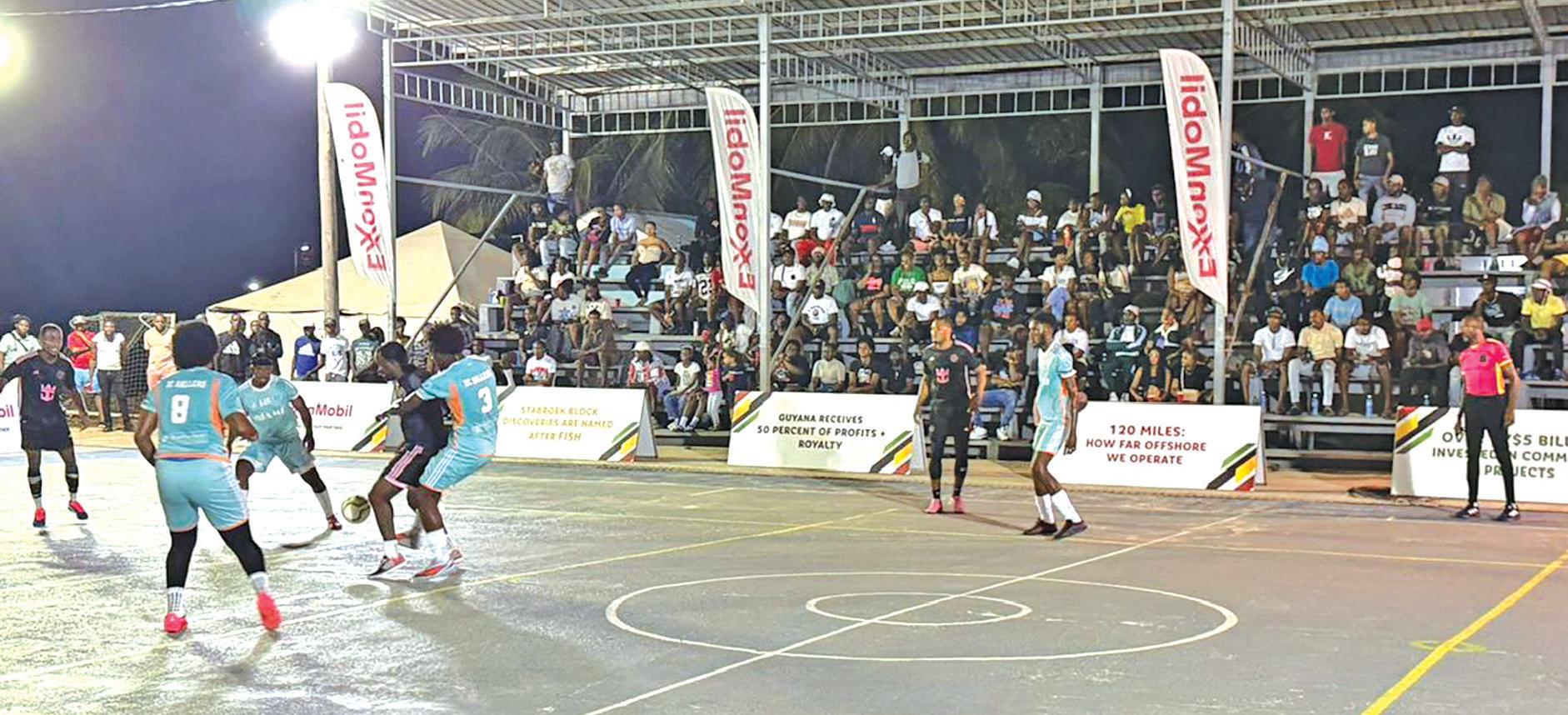

Defending champions YMCA brushed aside Spaniards 6-2 when the group stage round in the ExxonMobil Guyana Futsal Championship concluded at the Retrieve Tarmac in Linden.
Jonah Simon led the way in the lopsided victory with a hat-trick. Adding a double was Kevin Gittens, while Jamal Bentick scored once. For the losers, Andrew Murray Jr and Tyler Lyle netted one goal apiece.
Meanwhile, Salah
Family and DC Ballers battled to a 4-4 draw. Cecil Jackman bagged a brace for Salah Family, while Andre Mayers and Nicholas Gentle scored one goal each. For DC Ballers, Stephon Jupiter bagged a double, while Shane Luckie and Amoniki Buntin scored one goal apiece.
Similarly, Hard-knocks and Bombers played to a 2-2 draw. Kwesi Quintin and Kenard Simon scored one goal apiece for Hard-knocks while Dequain Samuels net-
ted a brace for Bombers.
Likewise, Young Gunners and Silver Bullets played to a 1-1 stalemate.
Jermaine Mason scored for Young Gunners, while Sigmund Cobena netted for Silver Bullets.
Also, Figgy FC defeated HH Ballers via walkover.
The elimination round will commence on Wednesday, with the quarter-finals.
The winners of the event will pocket $1,500,000, while the eventual second-,
third-, and fourth-place finishers will receive $750,000, $350,000, and $200,000, respectively, and the corresponding accolade. On the individual level, the eventual Most Valuable Player (MVP) will ride away with a motorcycle. It was also disclosed that a $300,000 economic grant will be awarded to a player or fan to aid their academic development. Each team must put forward a candidate for the aforesaid scholarship.



Newly-appointed Captain of the Guyana Harpy Eagles side, Matthew Nandu described his side as a balanced team as they seek a rare Super50 Cup title.
The side is stacked with young but talented players, but the likes of Gudakesh Motie and Keemo Paul will be senior figures in the team.
“Our biggest strength is our balance. We have quality in both departments, batsmen and bowlers with real talent and skill. Once they’re given the opportunity, I believe they’ll step up and perform consistently,” Nandu said.
The fast-bowling department is short

on experience barring Paul, but Nandu remains confident that his young brigade will step up and stick to the plan.

“Even though they’re young, I have full confidence in them. Once they’re handed the ball, I expect them to stick to the plans we set, adjust quickly to the conditions, and execute to the best of their ability. They’re eager, they’re learning, and they’ll give everything for the team,” the young Captain said.
While the squad features some surprising inclusions and omissions, the selection of pacer Sylus Tyndall has been a topic for discussion. The Berbice quick played only one match for Berbice in the Super50 in-
ter-county and he didn’t bowl a ball. His selection came on the back of his talent, and him being a contracted player.
When asked about Tyndall, Nandu remained diplomatic.
“Tyndall is part of our fast-bowling group, and if he gets the opportunity, I’m confident he’ll make the most of it,” he said.
Nandu has been in red-hot form in the local season. He was named the Most Valuable Player (MVP) in the tournament where Demerara and Essequibo shared title honours.
“Personally, I want to keep learning and grow into the role as strongly as I can. My focus is on leading by example and bringing the best out of the group. Ultimately, our collective goal is to compete hard and win the Super50 title,” Nandu explained.
The Regional Super50 bowls off on Wednesday, November 19. Guyana Harpy Eagles will face Jamaica Scorpions at Queen’s Park Oval in Trinidad from 09:00h local time. (Brandon Corlette)
